#this movie is far deeper and more nuanced than it gets credit for
Explore tagged Tumblr posts
Text
youtube
One of the best analyses of this movie, and specially Ariel as a character and what she represents, I've listened to so far.
#ariel#disney#the little mermaid#meta#disney meta#youtube#character analysis#disney princess defense squad#it's so ironic that so many people misunderstand this movie and her story just like triton sebastian and most of the other characters did#although i would add that eric both mirrored her and was seen as a representation of everything ariel adored about the human world#he was an ideal of humanity as well as someone who could understand her#he didn't have to be the male version of ariel in order for that point to get across#aside from that little point everything else she said was on point#the movie can be perceived as an analogy for racism/xenophobia too in many respects#but i definitely see the lgbt reading in the story which is why this movie has been quite an icon in that community#both far leftists and far rightists do not understand this movie which is why they criticize it so much#only balanced people actually understand it well#ultimately it's a movie about understanding getting past prejudices and letting people be who they are#interestingly enough the people who don't understand this movie are exactly just like the characters in the beginning#this movie is far deeper and more nuanced than it gets credit for#Youtube
6 notes
·
View notes
Note
Then I look at Harry, who must have been seeing everywhere, day after day, that he was the one with ‘it’, that he was the beating heart of the band //
I agree with this anon. That’s why it’s so fucking annoying how Harry fans act like he’s stupid when he struggles to communicate. “The movie feels like a movie thing” That killed me because it’s like he was trying to find positives for what seems like an overall problematic film. He wanted to express his darker side for once in that movie and sadly that opportunity wasn’t the best for him. That doesn’t make him stupid because he doesn’t know how to express complex feelings around a topic that really harmed his image that he worked very hard to construct. I explain mid days to people as “I’m here right” “it’s a workday” how’s that different from “a movie that feels like a movie”
Harry as he’s even said “I was awake at the start of the world.” He’s so much deeper than so many people see or give him credit for and it’s part of the thing that makes him shine and seem more than human, it’s his light and that comes from the soul. He works to build himself as a human and that’s why we can all grow with him.
He did get the piss taken out of him for years, you can see him shut down in so many interviews because people don’t let him talk, talk over him, or don’t understand him. So much promo for four he is just so shut down. You can see it in his eyes. I remember being a fan at the time and feeling so sad for him. He was so obviously depressed and heartbroken, and that has been confirmed by the stuff he wrote in his first album or for his first album “I’m not happy” anyone?
He may shine but let’s not act like 1D wasn’t toxic and abusive, that he wasn’t sexualized as a young teenager and disgustingly so with ties to the Larry shit that is still harassing them to this fucking day. He has been viciously stalked by people and paps and he still does his job. Just because you can thrive in a toxic environment doesn’t mean you are toxic, it means you are resilient, because the core of who you are is strong enough to push you through. And then people talk about how he’s media trained and that’s why he answers how he does, not that he’s actually a good person who is nervous when he’s speaking publicly and who feels comfortable in certain topics. Or as someone with obvious deep and complex trauma.
Letdown blog I found years ago and always hated how far they had to reach to try to make him seem shitty when really he’s always been doing the best he can with what he has and who he’s with. Everyone who thinks so poorly of his team that’s been with him for years piss me off too. Like yeah they’re industry people but they’ve also helped him become a Grammy winning global artist. Jeff isn’t perfect but he’s also not his father and it’s shitty for people to always shit on his family, friends and partners. He already struggles to feel good enough (again shown in so many songs) and knowing that anyone he loves will be abused is horrible. He may not be the abuser but he’s the cause of it and he knows it.
I could go on and on about his suffering but he doesn’t seem to want to dwell. I just wish people saw him with the nuance that is so obviously there. But maybe deep recognizes deep and they can’t see the truth because they haven’t done enough self work to see clearly.
Interesting thoughts.
By 'it's a movie that feels like a movie' he didn't mean that the film was 'problematic', though. He meant it felt like a good old fashioned movie, filmed on location with costumes and a big cast, rather than the green screen acting he did for Marvel.
8 notes
·
View notes
Text
the cinematography of destiel
so to cope with spn ending, I’ve been re-watching it from the beginning and have just been massively hit by the cinematography of destiel. it’s not something I really picked up on the first time round – I was too busy falling in love with their relationship – but HOLY SHIT. everything about the cinematography of cas and dean’s relationship plays so heavily into romantic cinematography tropes.
we all know that destiel was heavily (heavily) implied through the storyline, the dialogue, that goddamn electric chemistry between jensen and misha and the way they played dean and cas. but (until the finale season ofc), none of that was made explicit, and the showrunners often claimed destiel was just a “fan interpretation” and nothing deliberate on their part in creating the show. after re-watching spn recently (and I’m only up to s9), I’m sorry but I have to say that this is so blatantly bullshit. the directing choices and cinematography of destiel were clear, deliberate choices that were made about how to portray the relationship between dean and cas. and it’s precisely these choices that so clearly places them in a romantic setting right from the start.
as much as the script and their chemistry, the cinematography of destiel is what marks their relationship as undeniably romantic. I mean, seriously. their scenes legit feature all the hallmarks of romantic cinematography. like, things that are literally only ever used to portray a romantic on-screen dynamic???
Soft, romantic lighting
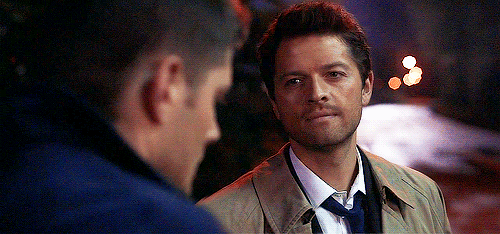
look at this shit. the soft glow full of warm hues and gentle shadow is the trademark of romantic scenes. there are a RIDICULOUS number of destiel scenes lit this way. in fact, I’d go so far as to say the majority of ones where it’s just cas and dean are like this: driving at night in the impala; countless scenes outside in the dark with soft light behind them like this one; even their goddamn fight scene is lit like a romantic movie scene.
as with stereotypical romantic scenes, this soft, intimate lighting is generally combined with emotional intimacy and vulnerability. this kind of lighting is purposely used for this type of scene because it makes people’s eyes twinkle and thus draws attention to emotional tension and intimacy of expression that are so typical of romantic scenes. I mean, you’d never have a scene with dean and bobby lit like the gif above, would you?
other examples:
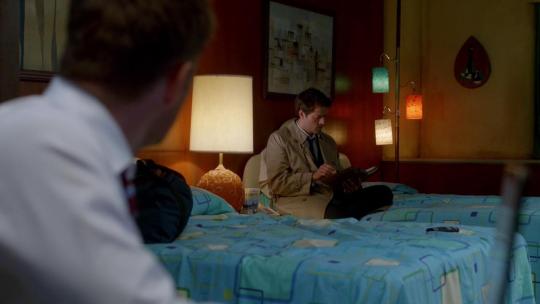
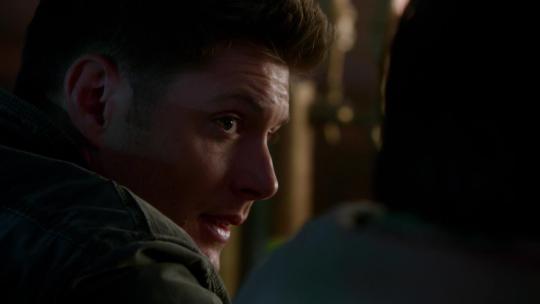
Focus on communication through eye contact and body language
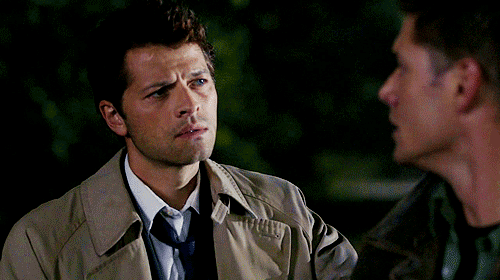
as with romantic movies, with destiel there’s a LOT of focus on non-verbal communication, particularly through eye contact. much more so than with any other relationship on the show, destiel depends on these, as is typical for the portrayal of a romantic on-screen dynamic; it ups the tension between the characters and gives the sense of a fundamentally deeper connection between them that explains their devotion and actions towards each other.
other examples:
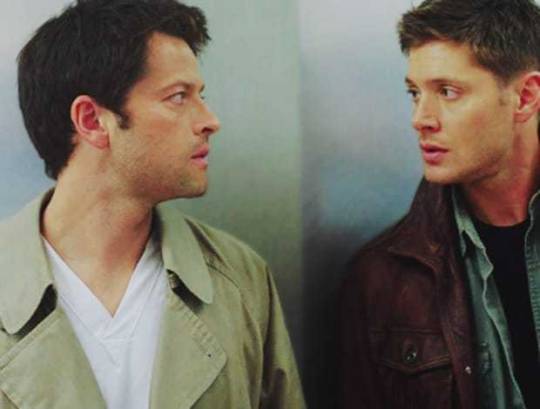
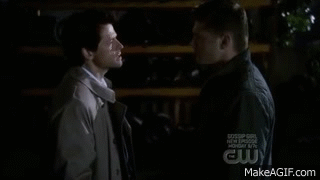
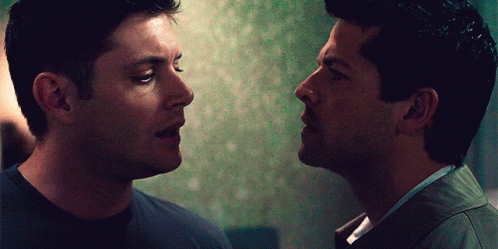
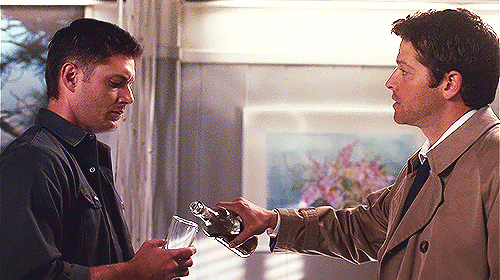
Interaction in quiet, intimate scenes

the scenes where cas and dean are on their own are typically quiet, softly lit environments where they’re completely alone and the outside world fades out, narrowing their focus down to each other. the intimacy of these settings implies in turn the emotional intimacy of their relationship and feelings towards each other. these are all settings where emotional vulnerability is made much more possible, and give the characters the opportunity to give light to versions of themselves that otherwise stay hidden.
again, this is something so typical of romantic cinematography, as it builds the emotional intimacy between the characters and gives deliberate focus to the unique dynamic that exists between them.
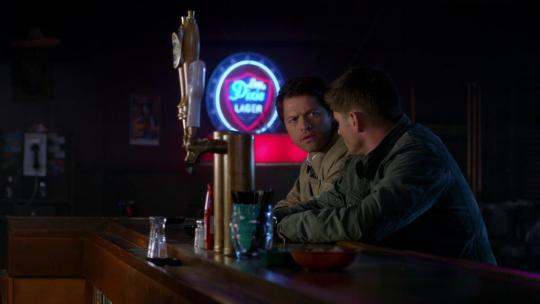
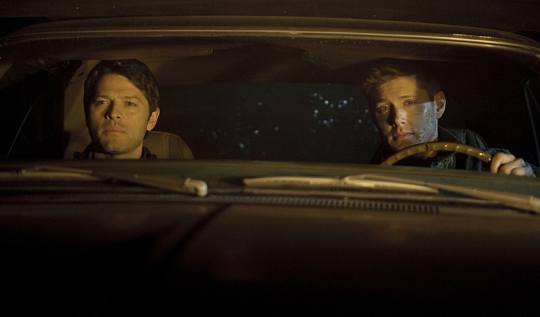
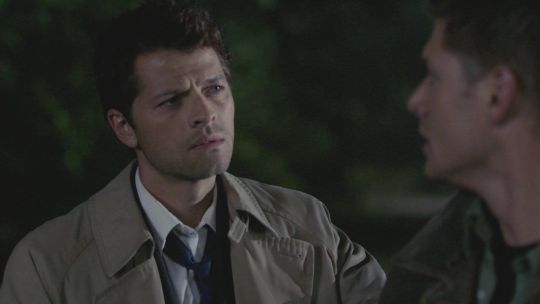
Camera close-ups, implying emotional and physical closeness
this has been the case literally since the moment cas and dean first interaction:
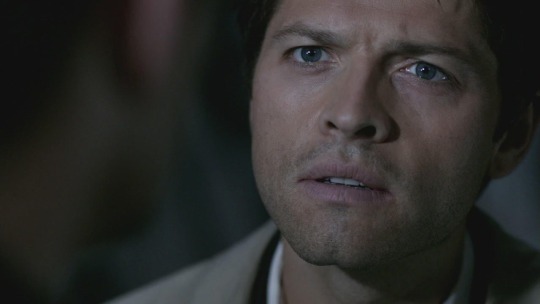
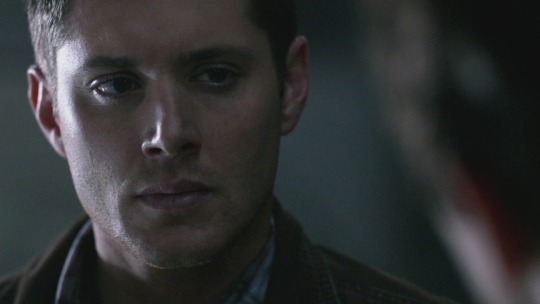
this close, intimate camerawork is one of the defining features of the scenes between dean and cas. it places the focus on all that is unsaid between them but is implied, the complexity and nuance of the way they interact and what they feel towards each other. how closely focused they are on each other. the choice to film their expressions at such close range gives space to this in a way that the show doesn’t do with any other characters, even when the emotional storyline between them is important. sam and dean come the closest to this, but even then it isn’t shot as closely as dean and cas’s scenes often are.
this close camerawork provides a kind of intimacy that we don’t see anywhere else in the show apart from in romantic contexts (and even then rarely on the level it is with destiel). this intense focus that draws attention eye contact, expression, connection, and non-verbal communication is another hallmark of romantic cinematography, serving to further emphasise the emotional intimacy between them.

gif credit: @softjensen

(I could go on forever with these ones, it’s literally the entire show)
Reaction shots like this

romantic movies like to use show not tell to reveal how the characters really feel about each other - typically by using reaction shots of their disappointment/jealousy/pain, e.g. when they see the person they love with someone else. here are SO MANY instances of this with destiel. the reaction shots of dean and cas responding to the other in romantic situations are used ridiculously often, and literally don’t make any sense if they’re not intended to imply a romantic dynamic between them. these reactions are completely irrelevant to the storyline - they only serve to give us information about the cas and dean’s true feelings about each other. THERE IS LITERALLY NO OTHER REASON FOR A DIRECTOR TO MAKE THE DECISION TO INCLUDE THESE.

(don’t even get me started on how quietly heartbroken dean looks in this scene)
other examples: cas’s reaction all the way back in s4 to dean kissing anna, and dean’s reaction to cas kissing meg.
so yeah. those are some of the main things I’ve noticed. it’s also very worth noting that the majority of destiel scenes (i.e. just cas and dean) employ ALL OF THESE KEY FEATURES OF ROMANTIC CINEMATOGRAPHY AT ONCE.
I really don’t think it’s possible, from this, that the showrunners weren’t deliberately hinting at the romantic nature of destiel from the very beginning. the cinematography speaks for itself.
#god i'm sorry this ended up being insanely long#i just have thoughts about this#also sorry for the bad quality stuff#this is basically a mix of gifs i found in the depths of my laptop and on google#i've tagged any gif makers i could find#please let me know if yours is here and i'll ofc credit you#destiel#destiel meta#destiel theories#destiel textpost#deancas#deancas meta#dean winchester#castiel#sam winchester#destiel cinematography#spn#supernatural#misha collins#jensen ackles#spn fandom#spn family#cw supernatural#spn meta#cockles#cockles being responsible for destiel#jenmish#my stuff#my posts: destiel
4K notes
·
View notes
Text
I'm bored. Time to do my extremely Marvel fatigued takes on every MCU... Thing.
-Iron Man: Holy shit it's a movie! It's actually a movie!
-Captain America: The First Avenger: ROCK SOLID. Shoutout to Agent Carter for being cool enough for her own spinoff series
-Thor: there is nothing remotely Norse looking about any of this
-Iron Man 2: -10 points for Elon Musk, whole thing is freakishly libertarian, but I like Justin Hammer as a villain
-The Avengers: Look, you can hate on Joss Whedon all you like and probably be correct, but this was the gold standard of superhero movies for a good while and with good reason.
-Iron Man 3: Character development??? In MY bloated superhero movie franchise????
Captain America: The Winter Soldier: trying to be deeper than it is when really it's just Steve fighting hydra again
Thor: The Dark World: well, that sure was a movie.
Guardians of the Galaxy: James Gunn's skill with the needle drop rivals Quentin Tarantino. Not just in this film but in all of his actually
Avengers: Age of Ultron: oh god why is the ROBOT quipping please make the robot stop quipping. Oh look Quicksilver's dead.
Ant-Man: this would be really good if it was directed by a director instead of two million overworked VFX artists
Captain America: Civil War: Hey, y'know that actually fairly interesting character conflict we brought up about government regulation of superheroes? What if we pretended it never happened by act 3 and then completely ignored it for the rest of forever?
Was there another movie here or did I make that up?
Doctor Strange: I love it when rich assholes meet poetic justice and the costume design on this film was unmatched. Although I still think it should have been directed by Lana Wachowski with Michelle Yeoh playing the ancient one but that's just me
Guardians of the Galaxy Vol. 2: teaching your dipshit male protagonist that toxic masculinity isn't something to strive for and showing him how to be better? FUCK YEAH. Also found family in a shitty spaceship my beloved 💖
Spider-Man: Homecoming: this is the closest the MCU has come to an accurate portrayal of Peter Parker, it's only downhill from here. Wait, why is Ganke here?
Thor Ragnarok: It's all the humour of a Taika Waititi movie with none of the compassion. Man's gone on record to say he only makes Thor movies for the money so if this is the price we pay for Jojo Rabbit, Reservation Dogs, and Our Flag Means Death, I'm okay with that.
Black Panther: hey maybe having your villain and only your villain saying racism is bad isn't such a good idea
Avengers: Infinity War: HE CAST TOO BIG FOR HE GOTDAMN MOVIE. Time to strip all these characters down to their barest bones because we don't have the time to do anything more nuanced!
Ant-Man and the Wasp: My Favorite versions of these characters will always be from the 2010 animated series and these ones just don't compare
Captain Marvel: we made a feminist girl power movie! What's particularly feminist about it? Carol gets catcalled exactly once and that's about it!
Avengers Endgame: is it over? No? Oh no.
Spider-Man: Far From Home: Peter Parker is not the "next" Iron Man, he's Spider-Man. Just let him be Spider-Man. Also seriously this is the wrong spidered man for Ganke why is he here
WandaVision: I am completely ambivalent about WandaVision
FATWS: are we supposed to believe that Sam and Bucky are friends? Also didn't fans give Wyatt Russell the 'non white male actor in a star wars movie' treatment for some reason?
Black Widow: 😐
Loki: Started strong and wandered off into the wild blue yonder of selfcest
What if: HEY WHAT IF...? YOU PAID FOR SOME DECENT ANIMATORS INSTEAD OF WHATEVER NERDS WITH BLENDER YOU CAN UNDERPAY AND WORK TO DEATH YOU MULTIBILLION DOLLAR CHEAPSKATES
Shang-Chi And The Legend of the Ten Rings: A post-endgame Marvel Movie that ISN'T hot garbage!
Eternals: couldn't be arsed
Hawkeye: Just different enough from My Life As A Weapon to avoid giving credit to Matt Fraction and David Aja
Spider-Man: No Way Home: Lots of things have been adapted into movies over the years: classic novels, comics, TV shows, plays, even video games! This however, is the first time a comic-con panel has been adapted into a movie. Also, no Spider-Man anywhere ever would EVER say "I just want to kill you myself" get a grip. I think I've now made my point about stealing Miles' best friend and giving him to Peter
Moon Knight: that's not an exciting Easter egg, that's an essential part of the character that you completely cut out and grafted on to the end
Multiverse of Madness: Nothing nowhere all at once. Themes? Character development??? PLOT??? Are you INSANE???? A good movie is one that's nothing but cameos and references to OTHER, BETTER MOVIES!
Ms. Marvel: Y'know, Kamala being a shape-shifter was kind of important because, comedic irony, top text learns she doesn't need to change for others, bottom text is a shape-shifter, you know how it is
Thor: Love and Thunder: haven't seen it, don't really want to
She-Hulk: Attorney at law: please just... Stop.
Comics are very good though! Read some comics!
12 notes
·
View notes
Text
Regarding Konaka’s influence on Tamers (or how much he actually didn’t have)
(Rest assured that if you’ve had a conversation with me recently about this issue, I’m not vaguing you; this conversation has come up a lot in the last few weeks, especially in my private chats, so this is just me deciding that I should write something about this for once since it’s been weighing on my head lately.)
I think, right now, with what happened regarding the DigiFes debacle, a lot of people are having complicated feelings about how to feel about Tamers, and this is completely understandable. I think there are also some things that may be inevitably unavoidable, such as starting to second-guess certain nuances in the series and what they might lead to. All of that is perfectly reasonable, and in the end, it’s going to be up to everyone to decide how they feel.
In light of this, a lot of people have been bringing up the fact that, while Konaka was the head writer, he was by no means the only person working on it. This is very much true, but I’d like to add something else to the equation: this is an issue that goes much deeper than the usual claiming death of the author for the sake of sanity. The full picture is that Konaka has always had much less influence on the series than the fanbase tends to attribute to him. Official statements have been very clear as to not attribute the entire series to him, and, among all the other controversial statements he’s made, Konaka himself has at least been very active about crediting the other staff members as far as their influence on the series! The idea that he was the only person who ever did anything substantial for Tamers is something I’ve been warning against since long before any of this happened (if you want proof, I have a post from April with this sentiment in it), and right now we just happen to be seeing what’s basically the worst possible outcome of the fanbase constantly worshipping him like the only real creative heart behind the series to borderline cult-like levels...when that’s never been true, and has resulted in unfairly taking credit away from people who deserved it.
I’ll go into detail below, and I hope this can help people understand the situation better and sort out how they feel about it.
Note that I make references to his infamous blog in this post, which I’m deliberately refraining from directly linking for obvious reasons, but all of the information is still there, so it should be verifiable if you decide to look for it yourself.
Personally, I’ve always found it really bizarre how there’s been this obsession with portraying Konaka as some kind of auteur whom the entirety of Tamers depended on. I’m not saying this out of spite towards him, because, again, even he himself was very insistent on disclaiming credit for things he wasn’t actually responsible for (he was quite humble in this respect, actually). Not to mention that I think it’s a mistake in general to constantly pin a single person in a multi-person production as the sole heart behind it, and the Digimon fanbase has historically had this strange double standard behind it when it comes to uplifting him as the only heart behind Tamers when nobody says that about any of the head writers for...anything else. (How many times has Nishizono’s name ever popped up when talking about Adventure? People are usually more obsessed with talking about Kakudou or Seki.) Konaka’s work is certainly distinctive, but Tamers had a lot more going on besides just that.
In fact, based on his own statements on the matter and all of the other official information we’ve gotten about Tamers production, while you can’t really quantify such things, it’s generally been estimated that Konaka was responsible for something like only a fourth of the series. Which is an incredibly low amount compared to what the fanbase would have told you before all of this happened, because of this fixation that he must be the genius mastermind behind the whole series. Not only that, this “brilliant auteur” image of him was so inflated that people were attributing way more of 02 to him than he deserved; 02 episode 13 was the only thing he contributed to the series and he was specifically brought on as a “guest writer”, and the overall plot of the episode was determined by the rest of the production staff and not him -- but ask the fanbase and they’ll tell you stories about how he invented some grand planned arc for 02 that got cancelled, or even that Tamers exists because of a “writer revolt” from him and other writers not being allowed to do what they wanted. (You know, as much as I understand 02′s a controversial series, it would be really nice if people didn’t make up completely baseless stories like this just to scapegoat it...)
I honestly cannot emphasize enough how much of the problem we’re in right now has been horribly enabled by the weird pedestal the fanbase has been putting him on. This is to the point where there’s even been a double standard where some of the more unpopular/criticized elements of Tamers must not have been the fault of a brilliant writer like him, and in fact was forced on him by the executives (this excuse had always been brought up anytime someone doesn’t like something about Tamers, just to make sure the image of him as a perfect writer was maintained). Turns out, as per his own admission on the infamous blog, while he wasn’t the one who initially had the idea of putting Ryou in, the part that rubbed the fanbase the wrong way -- that he came in as an accomplished senior who was better than everyone and played up by everyone in the cast -- was unabashedly his idea (he apparently was enamored with the idea of having someone like Tuttle from the movie Brazil). Again, this is a weird scenario where even Konaka himself has been more humble about this issue than the fanbase’s perception of him; he fully admitted whenever he had trouble writing certain parts. For instance, he doesn’t actually like writing about alternate worlds, felt they were out of his comfort zone, and only wrote in the Digital World because the franchise needs one; he’d stated that if he’d had his way, the Digital World arc wouldn’t have come in as early as it did, which might be a pretty shocking statement for a Digimon fan to hear.
If you want even more specifics, here are some extremely major parts of the series that Konaka was not actually the one behind:
The character backgrounds. Konaka stated on his blog that he wasn’t interested in going too much into character backstories because he felt it was too plot-limiting to say that a character is the way they are thanks to something in their past or background (basically, he cares more about plot than character for the most part), and that he’s also not into worldbuilding. Certain things like Ruki going to a girls’ school were supplied by Seki, who infamously loves worldbuilding, family backgrounds, and character settings.
Certain nuances of Ruki’s character, especially the part where she’s pigeonholed into uncomfortable places due to being a girl, were informed by Yoshimura Genki, writer from Adventure and one of the head writers of 02 (who eventually would go on to create an entire career out of feminist cinema).
According to the posts on his blog, Impmon’s character arc didn’t have much input from Konaka himself and was largely written in by Maekawa Atsushi (also a writer from Adventure and one of the head writers of 02).
The whole concept of Yamaki being redeemable in the first place was something Konaka didn’t originally plan for; he’d initially intended to make him a straightforward antagonist, but, of all things, his Christmas song, combined with the input of the other writers (especially Maekawa) humanizing him, led to the development where Yamaki eventually changed sides and became sympathetic. (This makes Konaka’s recent stunt revolving around Yamaki a bit painfully ironic.)
The director, Kaizawa Yukio, was deliberately picked because he didn’t have experience on the prior series, for the sake of changing things up, and he spent Tamers as a period of studying what Digimon should be like. Based on what he’s hinted, it seems Konaka's writing style and choices were able to have as much influence as they did because Kaizawa approved of them -- that is to say, Konaka’s detailed imagery and descriptions were extensive enough that Kaizawa could go “sure, let’s go with that.” But in the end, nothing Konaka did would have gone through unless Kaizawa and Seki (among many others) didn’t also approve of it or provide input. Moreover, Kakudou Hiroyuki (director of Adventure and 02) has also been stated many times to have been a valuable consultant on invoking Digimon so that the new staff could understand what to aim for and how to get the right feel (and also assisted with providing stuff for the mythos, such as the Devas). Nevertheless, Kaizawa also seems to have had his own strong opinions and input on the story; he especially seems to get passionate when it comes to the topic of making the story something the kids watching it could relate to and imagine. (He would eventually go on to direct Frontier and Hunters, along with several episodes of the Adventure: reboot.)
So in other words, looking at this, a lot of these things that people emotionally connected to and loved about Tamers are things that literally were not his personal creation, and were largely contributed by the other writers! Of course, Konaka’s “creator thumbprint” is very obvious -- he was the head writer, after all -- and all of this had to go through his own vetting to make sure he personally liked it as well -- but nevertheless, you can see that this very much was a collaborative effort from head to toe, with him being very open about this fact himself. Insisting on making sure that this fact is well-known isn’t just a coping mechanism to try and remove his presence in the series, but rather a desire to get people to seriously stop giving him credit that really should be going to others (especially since, again, even he himself was very diligent about assigning that credit).
In the end, I’ll leave you with another thing to keep in mind: Konaka doesn’t get paid anymore for Tamers work (unless they make something new like the DigiFes thing), so continuing to buy Tamers merch and supporting the series through fanart and such will probably end up going more towards the Digimon IP as a whole. Basically, if we’re just talking about Tamers specifically, what degree this is going to matter is only really relevant to the content in the original series, which is now twenty years old and remains unchanged. By Konaka’s own admission, he wasn’t into all of these conspiracy theories until 2010 at the earliest, so while it’s understandable to be a bit wary about the themes in Tamers having traces of the base sentiment, the original series itself does not seem to be an outlet for alt-right propaganda, and it’s probably forcing it a bit much to read into it that way. Konaka’s also repeatedly insisted that all of his attempts at a Tamers sequel have been rejected and that he’s been doing increasingly strange swerves to get around members of the original cast not entirely being available, and the Japanese audience has turned out to not be very fond of the contents of the 2018 drama CD and the stage reading for reasons entirely separate from the politics, so it’s also unlikely we’ll be getting a Tamers sequel from him or something in the near future.
So -- at least for the time being -- what’s done with him is done, and the remaining question is how all of us feel about Tamers. I think everyone will have differing feelings on it, and that’s perfectly understandable. Personally, given everything I just said above, I’m going to continue treating it as a series very important to me, and one that many people (including, as it seems, a very different Konaka from twenty years ago) worked on with a lot of effort and love, although you may see me getting a bit more willing to be critical about the series and its themes thanks to my concerns about some of the sentiments in it and what they imply. I also completely understand that there are probably people whose associations are going to be much more hurt and who will have a much harder time seeing the series the same way ever again, and I think that’s reasonable as well. But at the very least, going forward, I hope all of us can understand the depth of this situation, give credit where it’s due, and not force credit where it’s not due.
73 notes
·
View notes
Text
THERE’S SOMETHING ABOUT MARY (1998)
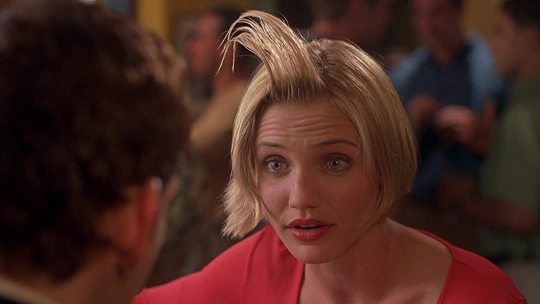
In 2019, Peter Farrelly crossed the Dolby Theater stage at the 91st Academy Awards to proudly accept three Oscars, including Best Picture, for his drama Green Book. For any director, these Oscars would be a crowning achievement. To Farrelly, this was also an induction into the Hollywood fraternity—that rarefied group from whom he and his brother, Bobby, had long stood apart. The Farrelly brothers had at one time been maverick comedy filmmakers whose brand was just the right combination of offensive humor and heart. As Farrelly raised his Oscars for the crowd, he was no longer the goofy outsider who directed gross comedies. He was an important filmmaker.
Be that as it may, Green Book—despite the awards coronation—was every bit the offensive relative to Peter’s work with Bobby. The film had generated tons of criticism for its handling of race, leaning heavily on cultural stereotypes for its humor and pathos, and presented a morally superior view of white privilege while possibly misrepresenting the only nuanced Black character in the film. These criticisms dominated the Monday Morning Oscar Quarterbacking on podcasts and Twitter threads, putting just a little bit of tarnish on the filmmaker’s new trophies.
Criticism and controversy are not new to either Peter or Bobby Farrelly. Since their directorial debut in 1994 with Dumb & Dumber, they have walked the tightrope of all offensive comedians. As Roger Ebert said about them, their movies are “crude, vulgar, cruel, insensitive, scatological, perverse, and politically incorrect.” Gene Siskel made sure he added “gross and raunchy” to that list. They meant this as a compliment. People died watching Jeff Daniels experience exploding diarrhea in Dumb & Dumber, Woody Harrelson share a post-coital cig with his grotesque landlord in Kingpin, and Jason Alexander wag his tail in Shallow Hal. Few would call any of their oeuvre particularly deep—and should probably laugh at the pretense of referring to their filmography as an oeuvre.
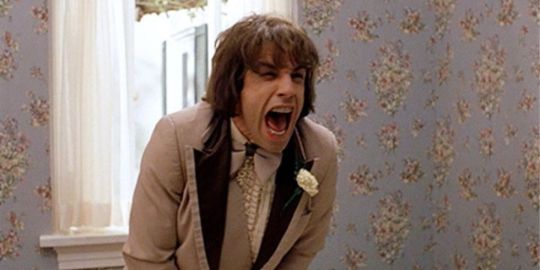
The most controversial, and arguably most popular, film of the Farrelly’s career is 1998’s There’s Something About Mary. This one focuses on a generic loser named Ted (Ben Stiller), who holds a flame for his teenage crush, Mary (Cameron Diaz). Because Ted believes Mary may hold the key to his happiness, he hires a private dick named Healy (Matt Dillon) to find out where she is. Healy falls under Mary’s spell and leverages his influence to keep Ted away. As played by Diaz, Mary is a “smart girl who has a lot going for her”; however, Mary isn’t particularly observant and awfully naïve. Every man she encounters falls for her, and she has a litany of stalkers who will do anything to possess her.
Based on description alone, There’s Something About Mary presents as a harmless rom-com, but the Farrelly’s bring their edgy style to the film. This movie is packed with indecent images. Ted’s “Franks N’ Beans.” Mary’s “hair gel.” The fish hook. Magda’s makeout session with her dog, Puffy. Woogie’s face. The gross stuff is what it is, but the material that sticks are the stalking and how the depiction of Down’s Syndrome impacted perception of those with mental handicaps. Reviewing this film through the lens of 2021 causes even more cringing than it did in 1998.
You could tell that even in 1998 there was a narrative building around this movie. In a press interview, Ben Stiller said, “I wouldn’t necessarily associate this film with deep social commentary. I think it’s a sweet movie that you can go out and laugh at.” Diaz added, “With this film, I know that [the Farrelly Brothers] wanted to have characters—people—that were important to the audience. They wanted a love story that people could really get involved with, as well as have the comedy.” She also said more recently in 2018, “Peter and Bobby have such heart in all of their movies. No matter how shocking the comedy is, there is so much that is inherently good about the story and the characters that really appeals to people and it makes the laughter at the jokes a little more forgivable.”
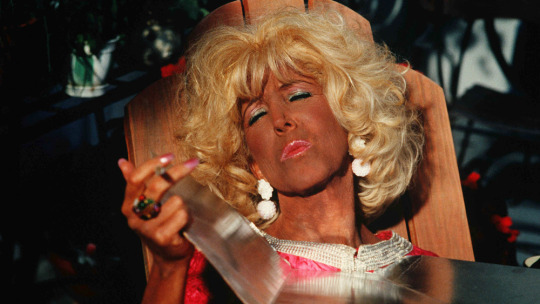
From the get-go, everyone on the project knew somethings were going to be potentially problematic. Studio brass expressed some concern over the decision to make an R-rated comedy. The PG-13 rating had squeezed out the R-rated comedy to the point that very few were being made. Movies like Friday (1995), Flirting with Disaster (1996), Private Parts (1997) and The Big Lebowski (1998) all had pretty limited audiences. No one was convinced an adult comedy could even make a buck, let alone entertain. Besides, the Farrelly’s previous film, Kingpin (1996), had bombed, so could they even be the duo to make a lucrative R-rated comedy.
On the set, there were concerns, too. Diaz worried about whether the infamous “hair gel” scene was a bridge too far, and might possibly be the ruin of her rising career. During the scene where Puffy falls out a window, Bobby Farrelly needed to get the right reaction from Diaz and co-star Lin Shaye, so he dropped his pants and wiggled his ass. It wasn’t the first time the director had done this, either on or off set. According to Peter, Bobby liked doing this; it would one day get him in some trouble. And the production was surprised when Plantation City Hall, whose veneer was redressed to become the exterior of Ted and Mary’s high school, asked to have their name removed from the film’s credits because they didn’t want to be associated with anything “lewd and offensive.” The studio was also worried about the decision to include a close up of Ted’s “franks n’ beans” after he catches them in his zipper. That shot was got by creating a 4’x2’ prop, and inserted just in case it needed to be cut out of the film. Fox chairman, Peter Chernin, after seeing a test screening, told the Farrelly’s, “It’s perfectly reprehensible; don’t touch a thing.”
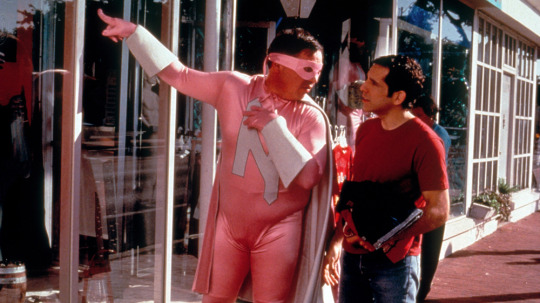
There were also questions about the portrayal of Warren, Mary’s brother, who has Down’s Syndrome. Peter Farrelly said, “Whenever you did [write disabled characters] back then, it seems the studio was, ‘No, no, no! People are uncomfortable’ [with disabilities]. And I’m like, ‘No, they’re not. That’s bull. People have disabilities, so let’s see them.” Warren was based on a next-door neighbor of the Farrelly’s to whom the family was close. The young man is also cast in the film as one of Mary’s students. It also seems casting may have been one way to circumvent controversy surrounding Warren. Initially, it looked like the part would go to Chris Farley, who was hot at that time for his work on Saturday Night Live. However, Farley’s energy may have contributed to seeing Warren as a caricature, so the production went with W. Earl Brown. Brown wanted to play Warren as a real person, not a cartoon. He said in a 2018 interview with Variety, “I just feel instinctively, ‘If you goof this, if you play it broad and you try to be funny, it ain’t going to be funny. The audience is going to hate you because you are mocking somebody with a handicap,’” This didn’t stop anyone from seeing the film as a possible Pandora’s box of disabled stereotypes and disparagement humor.
The other controversy surrounding this movie has become more pronounced in the social media age. Does There’s Something About Mary normalize sexual predation and stalking? Critic Rachel Verona Cote said, “Humor that takes stalking seriously requires nimbleness and nuance that the Farrelly brothers lack; instead, they trade in crude jokes underpinned by the structurally misogynist ‘boys will be boys’ mythos.” There may be something to this criticism. In 2016, a University of Michigan research study, entitled “I Did It Because I Never Stopped Loving You,” found that women are often more tolerant of aggressive male behavior because of the normalizing of such behavior in romantic comedies. There’s Something About Mary was one of the films cited in the report, which suggested that the film’s excusal of male aggression supported “stalking myths,” which were defined as “false or exaggerated beliefs about stalking that minimize its seriousness.” Findings like these also support research that has been going on since Harriet Martineau began pioneering the field of gender conflict. The Martineau Theory suggested that exposure to disparaging humor towards a particular group often has the result of inducing tolerance towards prejudice directed at that group. Martineau’s work focused on gender theory, but could just as easily be applied to any group.
Obviously, there is no truly right or wrong answer in regards to There’s Something About Mary, but as you watch the film, it seems a new lens may need to be applied. Even as we laugh at the cringeworthy humor of the Farrelly Brothers, what is their target? What behaviors are they excusing? Ben Stiller suggested there was no deeper political meaning to the film, but does that deeper meaning have to be intended to be valid? As There’s Something About Mary nears its 25th anniversary, we now look at it with more nuance, also with the realization that Peter Farrelly’s Oscar victories for Green Book suggest his once outsider take on comedy and culture is now firmly at the center.
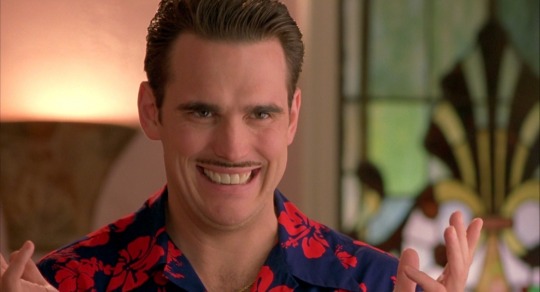
#There's Something About Mary#Peter Farrelly#Bobby Farrelly#Farrelly Brothers#Cameron Diaz#Matt Dillon#Ben Stiller#Lin Shaye#Comedy#Romantic Comedy#Offensive Comedy#Green Book
3 notes
·
View notes
Text
ok so im tired
The problem isn’t ‘not enough people of color or women are making enough good films and TV shows.’ The problem is whenever someone ACTUALLY gets recognized, white, cis men think that their own identity and the ‘integrity’ of award shows are being compromised to appeal to diversity. I remember watching Ramy Youssef accepting his Golden Globe for his performance in his own show, Ramy. Now, the show itself is incredible; as someone who’s trying to maintain faith and culture (though not Muslim), I found a lot of the things in Ramy’s reality really interesting and relatable. I felt like this was a story that many people have experienced, and making it a comedy makes our own lives more enjoyable. Furthermore, it addresses real issues in a way that exposes how ingrained they are in our everyday lives, and how (as a latina and child of immigrants) I had to grow up with all these preconceptions about myself and the people around me. However, when he was making his acceptance speech, a person walked up to the screen and talked over him, saying, “He only won because he’s Muslim. The academy loves to pick people because they’re diverse, and it’s unfair how political they are.” Yet, how can this statement be true when most of the nominated people were white? If the Academy truly rigged elections to pick people based on diversity alone, the whole audience would be different shades of brown, correct?
And why does the meaning of the award change depending on whose hand holds it? Without seeing the show itself, how can a person decide the merit a person deserves? Not only does it discredit the hard work a person did to fulfill an artistic vision, but it implies that the main difference between a white man’s work and anyone else’s is that a white man always deserves to be nominated. According to this ideology, a white man will always produce quality work that deserves every award it is teased with; everyone else is only there to piss off Republicans.
Listen, a lot of movies were good this year; i recognize that. But what I don’t understand is that in an industry where creativity is encouraged, a formula has developed that systematically puts some movies at a higher value than others. In a sense, there’s an elitism that only recognizes movies that appeal to a certain demographic and doesn’t venture too far from the center and actually pushes boundaries. Some actors aren’t getting nominated based on their actual performance; they’re getting nominated because, well...they’re That Actor. They are always supposed to get nominated because that’s What this Actor does.
And this reality sucks! How the hell am I supposed to say “women and people of color aren’t recognized enough” when the first argument I receive is, “what? men can’t make good movies?!” What, in fact, can I say that won’t make me feel trapped or won’t let people ignore me like they’ve been encouraged to do? And how can I say “The awards that aren’t segregated by gender but are still given to us are so few that we can’t even change the pattern?” Without someone saying “Well, you won that year!”? How can I communicate my point for people to actually understand that one award in more than 75 years isn’t nearly enough to solve a deep-rooted issue like this one? And how the hell am I supposed to actually create knowing in the back of my mind that if I don’t get recognized, people will automatically shrug it off with, “Well I guess women/POC didn’t make any good movies this year!”
In this reality, a Gerwig film will never come CLOSE to a Scorsese film. Or a Tarantino film. And, mind you, I’m not saying that these two men don’t deserve their nominations; OUATIH was a good movie, and I’m sure the Irishman was good (listen, I’ll be honest - i’m not sitting through a 4hr movie about Old People who Used to be Interesting). What I am saying is, Greta Gerwig had a truly interesting take on an old classic and made something important of it. And while she did all that, she made a stunningly beautiful film with a star-studded cast that truly made Little Women something incredible. Every single March sister had an assigned “fate” for women at the time, and throughout the film, Gerwig’s writing demonstrated that we’re still in this reality today! And film analysis aside, her creativity shone, and Little Women was intelligent, well-spoken, INTERESTING...I finally felt like there was a movie that had packed all my frustration growing up in a patriarchal world, even exploring a male character trying to live outside that world that didn’t suit him, and made that frustration art. Not seeing Gerwig receiving proper credit for directing this movie into perfection was disheartening, to say the least.
Furthermore (and this point will be shorter), there’s also a prejudice around actors usually known for comedies. In short, the elitism goes even deeper to exclusively prefer drama actors over comedic ones. Ironically, however, the dramatic performances by these comedians tend to shine, exposing these people as truly talented actors with a versatile and noteworthy range. Of course, this brings me to mention Uncut Gems, which deserved a seat at the table, and it makes me mention Adam Sandler, who truly SHONE. Furthermore, Awkwafina (and The Farewell in general) was incredible, and the story she told was powerful and amazing. Though Hustlers was not my favorite movie, Jennifer Lopez was AMAZING...yet these aren’t ‘serious’ actors, right? They haven’t done whatever the fuck these other people have done!!!
We have to start recognizing newer directors, newer writers, newer actors, newer stories that haven’t been explored before or invent a new category on Netflix or whatever. Not to be Virginia Woolf on main, but there is a certain beauty of ordinary life, of ordinary women, of ordinary people of color, of ordinary people from the LGBT+ community, that doesn’t have to be fetishized or insulted in order to be of worth to male audiences. Women don’t have to beat up, people of color don’t have to be criminals, men don’t have to be war heroes or powerful bosses or manly at all! What are we supposed to learn from art and culture if we are only exposed to the same points of view over and over again? What makes a tired world war story (albeit a different world war this time) - in which the SAME people are considered infallible heroes (even though in WWI no one truly was the good guy but that’s another point) - something new and truly nuanced about our society or the way the writers think or tell stories? I can’t critique any of these old, white, male directors or writers or actors because not wanting to watch their films or whatever makes ME the idiot for “not knowing what culture is”! If their names are the only things giving them merit, then they can do no wrong, and I am in the wrong for preferring someone else’s movie.
tl;dr Movies are a form of art, and everyone is encouraged to indulge in said art and make something wonderful. Yet, if we are going to applaud certain pieces of art over others, then we have to break down these nonexistent barriers that define what “valuable art” consists of. We can’t change the definition of good art based on whoever holds the award, and we can’t hold good art to the same standard of people who no longer know what the world of art looks like. Give people a chance to actually CREATE; and see how beautiful films can actually be.
#i know im just some meme account but hey u signed up for this#raw unfiltered AAAAAAAA babey#and yeah im just a nerd on the internet but im mad and someone might care#im just tired of never being listened to and actually having thoughts ya know#anyway heres wonderwall#oscars#films#movies
6 notes
·
View notes
Text
My MCU Phase 4 Wishlist
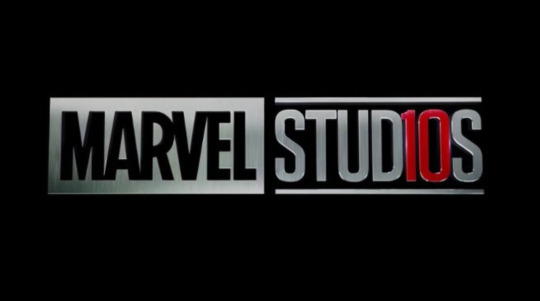
So, over a decade and 23 fucking films later an era of Marvel’s Cinematic Universe has finally concluded with “Spider-man: Far From Home” premiering last week.
It’s still staggering just how robust this franchise is considering in just eleven years’ time it already has amassed nearly as many films as the James Bond franchise and is arguably a more bankable series at this point than “Star Wars.” Though it’s not a perfect series by any stretch its success is nonetheless tied to its consistent, often magnetic charm and grand action set pieces and Phase 3 showed that it was even capable of some complex and nuanced growth. The third phase tackled deeper more emotional issues for our favorite super heroes while also giving many of its directors more free reign to do as they please with their scripts. Not always perfectly but it was more often than not hugely successful at reaching audiences on a personal level.
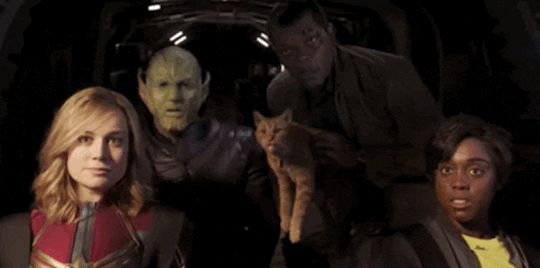
(Sometimes with mixed results...)
But as much as “Endgame” was a near perfect sendoff for this franchise, The Mouse isn’t done by any stretch with churning these films out seemingly until the end of time, so with that mind where should Disney go from here since it looks like the franchise will continue on indefinitely?
There’s a lot of ways to envision success for the MCU, and some wheels are already in motion between next year’s “Eternals” and Disney+’s streaming MCU shows but what would it really take for this series to get to the next level? Well this writer has some ideas and is more than happy to share a few of them.
Make the Villains More Prominent (and stop killing them off!)
Less so in Phase 3 but consistently throughout most of the series has been a total lack in quality villain performances and story-telling. Whether they are generic mustache-twirlers, essentially dark mirrors of the hero or just plain half-baked characters, the MCU has really done a disservice to its robust catalogue of rogues by often wasting the talents of great actors and actresses all to just check a box in a super hero script.
And on top of that they are consistently dead by the end of each film giving them no chance for growth in a sequel. I mean it’s not like we haven’t seen that work before right?
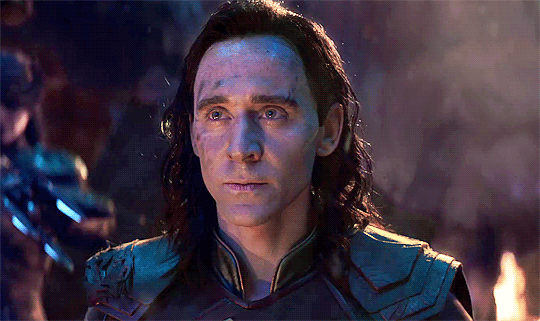
(Case in point)
For phase 4, especially in the wake of two thirds of the Marvel’s Holy Trinity out of the picture, villains should take center stage now more than ever. The heroes of this newer, younger and developing Avengers are probably not ready for the responsibility of protecting the world and the universe as evidenced by the near catastrophic mess Spider-man commits in “Far From Home” and to have the villains of this next phase take advantage of that would be a smart move.
These villains need to be prominent, larger than life and command a nuance to them that much of the older films did not have. A character like Norman Osborn for instance could step in to fill the power vacuum left behind by Stark’s shadow as the new tech futurist of Earth but of course without the responsibility and good intentions of Iron Man. Doctor Doom could be a counter to Black Panther’s Wakanda as a polar opposite of nations in Latveria. And bringing on a character like Mephisto could further expand the mystical side of the MCU that started to be explored in “Dr. Strange.”
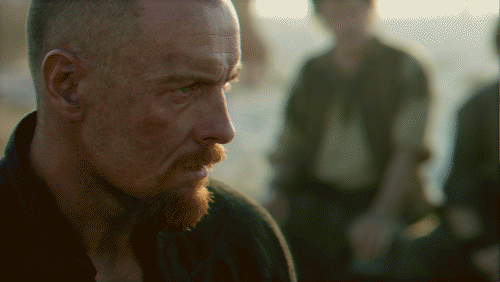
(But seriously, Marvel Studios, if I don’t get Toby Stephens as Norman Osborn I will riot...)
Either way, these villains need to carry on for more than one film for a change. Only Thanos, Vulture and Loki have managed to get past their first movies but if Phase 4 is going to be more distinctive it needs to have these villains come together in some way, perhaps even a *gasp* team-up! Having the villains form a super team to fight a younger more inexperienced Avengers could provide for some great drama and welcome change to the usual “fight an army of nameless goons, aliens and/or robots” of the previous era.
In any case, Kevin Feige and The Mouse need to have their sights set on truly developing these villains beyond just simple one-offs and into fully fleshed out characters that can continue to be trouble for our heroes across the series.
Expand the Cosmic Spectrum of the MCU
The MCU is a science fiction series, if that didn’t already occur to you before, what with it’s iron-suited heroes, super soldiers and in these last two phases space aliens. With the latter the next phase really needs to lean into this and all its possibilities.
There’s a wealth of characters and worlds to explore on the cosmic level of Marvel Comics that not just the Guardians of the Galaxy can be a part of and Disney would be smart to bring even more properties into this real estate of the MCU.
It should namely start with Adam Warlock who was teased in the mid-credits scene of “Guardians of the Galaxy Volume 2.” Warlock has long been a favorite character of mind, dating back to reading my dad’s old copies of the Infinity Gauntlet and Infinity Watch. He’s a charismatic character who effectively blends both the cosmic and mystical side of the Marvel Universe together that can lead to a wealth of possibilities across the new MCU. Who should play him is purely subjective at this point but I can tell you right now Zach Efron isn’t even my fourth choice on that particular ladder.
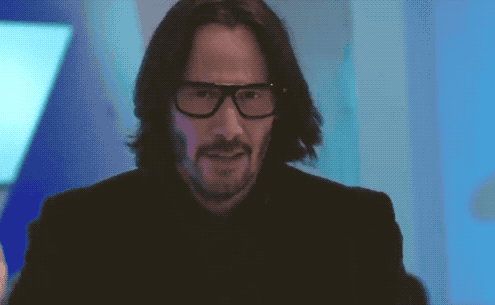
(Maaaaaybe?)
With the Fox deal, Disney also has the option to bring Silver Surfer and Galactus into the mix which they absolutely should at some point. Beta Ray Bill is also said to be making his debut in “Guardians of the Galaxy Volume 3” who can take over for Thor as Chris Hemsworth will eventually move on from the franchise at some point. Guardians will eventually need to retire too of course which opens up the possibility for the Infinity Watch with characters like Moon Dragon, Maxam and Pip the Troll and don’t tell me any of them wouldn’t work on the big screen. If Rocket Racoon can be a fan favorite Moon Dragon, Pip and Maxam can definitely make it too.
Either way the Marvel Universe is big fucking place and Disney would be dumb to not explore more of it for future franchises.
Make better Original Scores
Johan Goransson’s Oscar win for Best Original Score for his work on “Black Panther” was a watershed moment for this franchise because it showed how super hero music can still be relevant. Imagine Christopher Reeve’s “Superman” without John Williams theme music or Christopher Nolan’s “The Dark Knight” without Hans Zimmer’s prominent percussion echoing the legend of Batman. Its not nearly as memorable and I feel the MCU has largely short-changed itself by not putting a higher emphasis on original scores during its decade-long run.
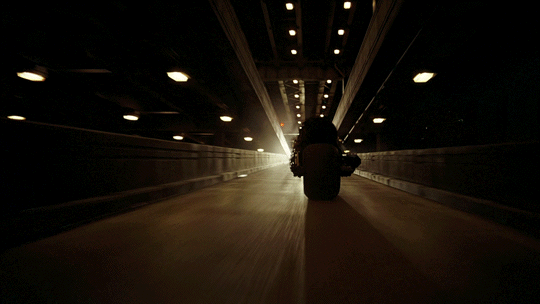
(*Bwaaaaaam BWAAAAAAAAAMMMM* I can hear this gif)
Phase 3 has definitely done a better job with this of course, Michael Giacchino’s work on Spider-man is solid, Alan Silvestri’s return to Avengers especially the “Portals” scene is epic as hell and again Goransson’s score is part of the reason we knew exactly what was coming next when Cap said “I know somewhere” before we even saw an image of Wakanda. But Phase 4, in my opinion, needs to make this more important as we introduce new characters.
Music has a way of echoing memories and ideas that we’ll immediately associate with an event or in this case a character and with the MCU heading into uncharted territory with what’s looks like even more unique characters, adding memorable music will help audiences identify with them. A catchy tune can go a long way to making a good scene greater just ask the binary sunset in “A New Hope” and it can make a character truly standout.
Imagine the next Avenger’s films if you will as all these new heroes come together on screen all their theme music coming together to culminate in one epic version of the Avengers suite. It will be glorious if done right and the MCU needs to make this happen with inventive composers and film scores in Phase 4.
Save the X-Men for Phase 5
I know with the Fox deal and the whimpering flameout of “Dark Phoenix” fans are clamoring to see what Disney and Marvel Studios can do to bring in everyone’s favorite team of mutants but I say “hold up.”
As much as I would love to see a (hopefully) more faithful rendition of the X-Men I think we need a breather from Professor X, Cyclops, Beast and especially Wolverine. The X-Men franchise has been going on for over two decades and as much as we would all like to see these mutants get some much needed redemption after “Apocalypse” and “Dark Phoenix” I think general audiences need a breather. Yes, The MCU brought in Spider-man barely two years after the “Amazing” franchise which flamed out badly as well but Spider-man, even by its franchise standards, had a considerably smaller catalogue left behind when he made his debut in “Civil War.”
I think teasing the reappearance of the X-Men in Phase 4 is probably fine. Maybe dropping clues on the existence of mutants, maybe mentioning an alternate universe they come from because chances are their backstory will be retconned but either way the X-Men should be left on the backburner for Phase 4.
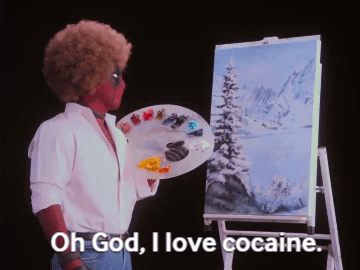
(Deadpool though? Keep’em coming.)
Make Phase 5 all about the emergence of mutants, build them up as a great new team for the MCU and perhaps even pit them against the Avengers down the road. Either way, let the X-Men have a break for now. They need it after what Fox did to them.
Bring in Diverse New Heroes
Oh, here comes that dreaded word that makes the slimiest denizens of the internet overreact and proclaim they’re not the “oversensitive” ones (in all CAPs of course).
The MCU had its fun with its main cast of primarily white Marvel staples over the past decade and if they’re going to show that they have new ideas and new stories to tell it should begin by bringing in browner heroes.
“Black Panther” was largely a breath of fresh air for the franchise because it told a very personal and relatable story to the society we live, primarily on the struggles of being a minority. The story wasn’t a simple good vs evil tale or nonspecific theme about family and love but of something deeply wrong in the world and it’s the reason it resonated as much it did.
The MCU is already making way for its first Asian American hero in Shang Chi, which is a good start but it shouldn’t end there either. Diverse heroes should be its next flagship for the new era of the MCU. Bring in Amadeus Cho, Ms. Marvel, and hell start teasing Miles Morales.
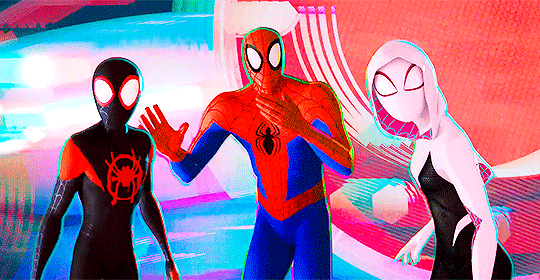
(And don’t give me that bullshit that black Spider-man can’t appeal to mass audiences...)
I can already hear the idiots shouting at the screen right now about “white erasure” or some other bull shit about reverse racism and/or forced diversity. First of all, these people would bitch about diversity no matter what way it was brought in. If a hero is turned from white to brown it’s “Why can’t they bring in a new brown hero?” If they bring in a new brown hero it’s “Why are they bringing in a new brown hero? No one cares.” And if people do care it’s “Forced diversity.” All I have to say to you people is you keep shifting around the goal posts so much to the point that it makes me wonder what you are actually angry about?

The MCU needs brand new blood and given that it again made a talking Raccoon a fan favorite there’s nothing that tells me this is a bad time to bring in more brown heroes from Marvel’s lesser known catalog. It isn’t that I or even other minority fans hate white heroes (I wrote an entire article on how much I love the MCU’s Captain America afterall) but for the sake of showing that these diverse heroes matter and giving them a chance to shine on the big screen this is needed. It wasn’t long ago that barely anybody knew who Black Panther was, now you have folks throwing up “Wakanda Forever” signs on their Instagram and social media and reading his graphic novels. So, open your mind up a bit and stop being a child about “forced diversity.” Thor was still epic as hell when he brought down Storm Breaker in “Infinity War,” Captain America still inspires patriotism in even the most cynical of souls and Iron Man saved the universe with a snap of his fingers. Your white heroes (and fragility) stories will survive a little spice in this franchise.
How the MCU truly proceeds from here will be interesting. There are already projects in motion of course and fans should probably be excited for it regardless of what I have written here but I do truly hope a lot of these happen in Phase 4. Marvel needs better more consistent villains going forward, the cosmic side of the comics deserves more exploration, better soundtracks will make these movies better, the X-Men need a break, and after 23 movies we could stand add a few more brown people to the mix.
Hopefully The Mouse is listening…
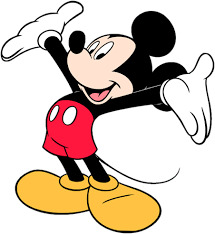
“Huhah! I own all future box office revenue regardless anyways, you peasants. Huhah!”
#Disney#disneyland#disney world#Walt Disney Company#MCU#Marvel#Marvel Comics#marvel cinematic universe#Adam Warlock#inifinity war#Infinity War#Endgame#Avengers#avengers endgame#Captain America#Iron Man#Thor#Guardians of the Galaxy#Black Panther#Spider-man#spider-man far from home#Spider man#Spiderman#Marvel movies#marvel films#film#movie#movies#review#Phase 3
6 notes
·
View notes
Text
Army of the Dead: The Problem with Zack Snyder Song Choices
https://ift.tt/3hQSbwk
This article contains Army of the Dead spoilers. Read our spoiler-free review here.
No one has ever accused Zack Snyder of being subtle. As the director who once had Henry Cavill’s Superman and the image of Jesus Christ in red and blue stained glass share the same frame, Snyder’s a filmmaker who likes his subtexts to be written across the screen whenever possible, preferably in neon. It’s an impulse that can lead to sometimes stunning visuals, such as Alan Moore and Dave Gibbons’ Doctor Manhattan filming the moon landing in Watchmen, and it sometimes can be as heavy-handed as Bruce Wayne turning into a literal bat in Batman v Superman: Dawn of Justice.
In other words, Snyder is not one for a light touch when it comes to crafting his visuals… or the music which often accompanies them. And fans who checked out Army of the Dead this past weekend on Netflix were reminded of that latter fact when the director’s penchant for on-the-nose needle drops reached its head-scratching zenith: Snyder ends his zombie movie with the Cranberries’ “Zombie” playing in the background.
As a song written 1994 by Dolores O’Riordan, lead singer of the Cranberries, it seems like an awkward choice for this action-horror hybrid on multiple levels. Considered one of the best alternative rock anthems of the ‘90s, “Zombie” remains among the top tier protest songs of the last 30 years. It was written by an Irish rocker in defiance of then-recent violence implemented by the IRA in the UK, which left two English children dead. Yet here it is in Army of the Dead, playing in a finale where Vanderohe (Omari Hardwick) crawls through the ruins of Las Vegas and the remains of its zombie hordes, with tens of millions of dollars on his back.
For audiences who know the history of the song, it’s jarring; and for those who don’t it is still abrasively trite to have the denouement of their zombie movie conclude to the wails of “Zombie, zombie, zombie!”
But for aficionados of Snyder’s filmography, it’s perfectly in keeping with the filmmaker’s attention-grabbing (and often gaudy) musical choices. Sometimes they can work in favor of his movies and sometimes against—and occasionally in the same scene. No matter what, however, they always make you sit up and take notice.
Admittedly, the use of non-diegetic music in films—needle drops where the music comes over a scene and has no source, such as a radio or live band, on the screen—is subjective. There’s no one set of rules about how to best employ popular music in a movie. With that said, at their best needle drops can either complement or comment on the scene at hand. They can add to the emotion of a movie moment, such as the wistful piano exit of “Layla” playing as the gangsters all get whacked in Goodfellas, or they can challenge the images we see and the story we’re being told, like when Beethoven is used to chilling effect as Malcolm MacDowell’s allegedly refined Alex attacks his friends in A Clockwork Orange.
But at its heart, the good use of a song surprises the audience, often by getting into the emotion or headspace of a character on screen, or illuminating it with some level of abstract distance. Of course the more popular the song is, the more you run the risk of the music carrying baggage for the audience. In period pieces, this can actually be an asset, with each song choice able to evoke a sense of time and place for the audience, particularly if it’s in the audience’s living memory—for example, just about every late 1960s music sample in Once Upon a Time in Hollywood—but it also means filmmakers traditionally want to steer further afield from the most popular Top 40 songs, unless it legitimately comments on a character’s perspective, such as the Crystals’ wildly romantic “Then He Kissed Me” also in Goodfellas.
Snyder doesn’t appear to worry about any of these issues with the song choices in his films. Rather he seems to embrace the cinematic and pop culture baggage of many of his needle drops, wearing them like so much ostentatious jewelry while strutting down the strip. Once in a while they can have the intended effect, such as when he evokes the image of the Vietnam War in the popular imagination by using Wagner’s “Ride of the Valkyries” in Watchmen, reminding audiences of the iconic union of that music with this conflict in Francis Ford Coppola’s Apocalypse Now while also commenting on how Vietnam is a different animal in the alternate history of Watchmen.
In most instances though, it just seems bizarrely under-thought, such as the inexplicable use of “The Sounds of Silence” also in Watchmen. The song is a Simon and Garfunkel standard which was famously written for The Graduate. So, genuinely, what is the point of that song being in Watchmen other than it sounds sad and was written in the ‘60s, and we’re now at the funeral of someone whose heyday was around that time? None of the characters onscreen actually liked the man they’re burying, and the piece just conjures up in the mind a much better movie which used that song with far more haunting nuance.
This drastic give-and-take in quality remains visible in Snyder’s Army of the Dead. Before the groan-inducing use of “Zombie,” Snyder rummages through Hollywood history again when he puts a cover of The Doors’ “The End” over the sequence where his team of casino robbers/zombie killers first enter the ruins of Las Vegas. The version in Army of the Dead is technically sung by The Raveonettes, instead of with Jim Morrison’s nihilistic groove, but it still inescapably conjures up images of Coppola’s Apocalypse Now. Well before Huey helicopters doubled as Valkyries in that movie, Coppola opened the film like an LSD-laced fever dream, with a Vietnam era rock song about the sweet relief found in death.
In Apocalypse Now, the song immediately puts the viewer into the viewpoint of Martin Sheen’s Willard, a war ravaged soldier (or “errand boy”) who even during his time off in a Saigon hotel room cannot stop thinking about the fires of napalm and the whirl of helicopter blades. His vacation is just an impatient waiting game before getting back in the shit. The placement of the slow-motion images with the Doors’ song creates one of the most hypnotic and nihilistic opening sequences of the 1970s—and in a film that has withstood the decades to be considered an enduring classic. So to use that particular song so unironically in Army of the Dead is thus numbing because it appears to be a naked attempt to draw a line between the visual madness of Apocalypse Now with a fairly formulaic zombie movie.
The comparison is unflattering to Army of the Dead, yet it was entirely avoidable. Which makes its use all the more baffling, particularly as Snyder’s movie does have some smart music choices.
In fact, there is one unabashedly great needle drop in Army of the Dead, and as with several Snyder films before it, this occurs during the film’s opening credits. Early on in the Netflix release, we witness the fall of Las Vegas to the undead hordes in montage, experiencing in vignette the horror of seeing Sin City dragged through the mouth of Hell. During this sequence, an ironic use of “Viva Las Vegas” is played. Initially, this would seem to be another lazy choice, as using songs that feature the setting of a city can lead to something as uninspired as, well, just about every other movie that’s featured “Viva Las Vegas” and not starred Elvis Presley and Ann-Margret.
But in the case of Army of the Dead, Snyder makes the savvy choice of having Richard Cheese and Allison Crowe record a new cover of the Presley lounge act specifically for his movie. Cheese, a comedic and kitschy singer who made a career out of doing ironically swinging covers of pop songs or heavy metal anthems, previously appeared in Snyder’s last zombie movie, Dawn of the Dead. In that 2004 remake of the George A. Romero classic, Snyder deliciously used Cheese’s big band version of “Get Down with the Sickness,” a Disturbed head-banger about embracing disease and death. Yet with Cheese’s stylish vocalizations, it sounds downright jaunty over images of human survivors waiting around to die as the zombie horde outside continues to exponentially grow.
By having Cheese, as well as Crowe, offer a strangely more restrained version of Elvis’ goofy love letter to the city of sin, Army of the Dead brings the musical heritage of Vegas to the forefront while also destroying it on screen to a familiar song turned disaffected. It’s a legitimately clever sequence.
Perhaps that’s why the use of “Zombie” at the end of the film is so disappointing. Like characters having orgasms in Watchmen while Leonard Cohen bellows, “Hallelujah,” having the word “zombie” sung over the finale of your zombie apocalypse movie feels cheap and crass.
Of course if you scratch a little deeper at the scene in question, perhaps there is added meaning. After all, the Cranberries’ “Zombie” is an anti-war song about “your tanks, and your guns,” and at the end of Army of the Dead, Hardwick’s Vanderohe just survived the biggest weapon of war of all: a nuclear bomb. Is he perhaps surveying the carnage left by the nuke and thinking to himself, “the horror, the horror?”
Read more
Movies
Army of the Dead: How Zack Snyder Is Revolutionizing Zombie Movies
By Bernard Boo
Movies
Army of the Dead: How Advanced Are Zeus and His Alpha Zombie Society?
By David Crow
Snyder has publicly suggested it might be open to that interpretation. In an interview with Joe.ie, Snyder said, “I did it because it was literally the first song that I had on my playlist when I was writing the script. I would just listen to it and I just felt like because the movie is self-aware and ironic, and it kind of understands what it is—I really love that song because of its politics and importance.”
Snyder may acknowledge the political context (more off-screen than on), but I still don’t think the sequence works in that regard. Vanderohe is a mercenary of war and who has spent the whole film killing zombies. Now a nuclear bomb saved him from being trapped in a city overrun by zombies, while also making him a rich man. His eagerness to reach Mexico City and enjoy his newfound wealth does not suggest some enlightened epiphany by either the character or the film about the danger of militaristic annihilation. Rather it accompanies just another glib “twist” to a horror movie ending where at least one character thinks he’s safe and then—surprise—he’s not. You know, like Snyder’s Dawn of the Dead and pretty much every zombie movie going back to Romero’s Night of the Living Dead original (a film which did have plenty to say about the systemic horrors of the world with its ending).
The anti-war meaning of “Zombie” might add an extra layer to its use in Army of the Dead, but its lyrics about bombs still play as obvious, and thudding. It’s a shallow correlation being drawn by a film that’s too shallow to actually have anything to say on this subject matter, especially with less than 10 minutes of running time left.
Much like Hardwicke’s zombie bite at the end, Army of the Dead’s bad decisions leave permanent scars on the whole.
cnx.cmd.push(function() { cnx({ playerId: "106e33c0-3911-473c-b599-b1426db57530", }).render("0270c398a82f44f49c23c16122516796"); });
The post Army of the Dead: The Problem with Zack Snyder Song Choices appeared first on Den of Geek.
from Den of Geek https://ift.tt/3uf3dhf
0 notes
Photo
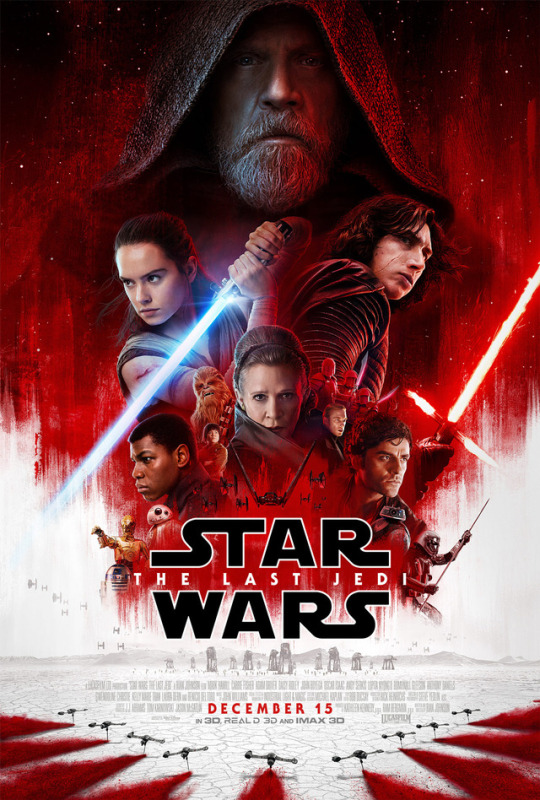
“Star Wars: The Last Jedi” Movie Review
DON’T WORRY, IT’S SPOILER-FREE. Just thought I would put everyone’s minds to rest on that. (I actually don’t remember the last time I did a spoiler review of anything, but that’s beside the point.)
It’s here. It’s finally, finally here. Star Wars: The Last Jedi has blasted into theaters at light-speed and all of your favorite characters are back (well, minus Han Solo, but you knew that. R.i.p, Han). This film, the eighth in the episodic Star Wars saga, was written and directed by Rian Johnson (Looper), and stars Daisey Ridley, Mark Hamill, Adam Driver, John Boyega, Oscar Isaac, Dohmnall Gleeson, Kelly Marie Tran, Laura Dern, Benicio Del Toro, and Carrie Fisher. The story picks up immediately after Rey lands on the island where Luke has been living for the past number of years as a castaway, her holding out his original lightsaber, the one his father had, to him. And that’s really about all I can say about the plot, because that was publicly announced in a number of marketing videos/promos, and basically everything else in terms of plot synopsis is essentially a minor spoiler; a minute spoiler, but a spoiler nonetheless.
This film would’ve been tricky for any director to navigate. Firstly, it’s the second film in its immediate trilogy, so if it’s not better than The Force Awakens, people might take issue with that. But not only is it the follow-up to TFA, a brand new director is taking the helm with it, and since Disney just asked that director to helm a brand new Star Wars trilogy after this one, that places a lot of weight on how good this film has to be for people to want to keep him around. Finally, the film has to take risks. It has to. One of people’s main issues with The Force Awakens is that it felt too much like a re-tread of the original Star Wars, so this entry in the franchise has to blaze a new trail in order to stand apart from the other films while also standing as one of the best in the franchise. And it does all of this in spades.
I saw this film twice in theaters in the same day, eight and a half hours apart, and I did this because there is a lot to process when this movie’s credits start to roll. I had to think very carefully about how I felt about the film, how I felt about the direction Rian Johnson had taken the characters and story, and whether or not some of the flaws that I had in my initial viewing still translated to the sophomore run as legitimate criticisms. But the first thing I thought to myself when I walked out of this film, both time was this: this film is bold, truly bold. This film is daring. It takes risks – a lot of them. It doesn’t play it safe, and that is such a refreshing and honest and beautiful thing to see in a tent-pole blockbuster franchise, especially the blockbuster franchise that Star Wars is.
Rian Johnson’s Star Wars tale is just as John Boyega said: fresh and new. And there are a million different ways that that can be addressed but for now, I’ll just say this: Rian Johnson is an excellent choice to helm a new Star Wars trilogy because you will be sure to get something fresh, bold, and original with each film he does. There are moments in this movie where both the audiences I saw it with applauded, moments where our collective jaw hit the floor in awe of the imagery that was on screen, and moments that subverted expectations in ways that made sense and served the story beautifully. Johnson did a terrific job directing this film, with spectacular action sequences to spare, and I can’t wait to see what he does next both with this franchise and with his other properties. (And just as a quick side note: John Williams’ score is even better here than it was in The Force Awakens, utilizing new themes and old in near-perfect balance. It’s confident, something the score for the previous film had trouble reconciling.)
The performances in this film are all excellent as well, with every major player absolutely bringing everything they can to each role, though some don’t get as much time to shine as others. Daisey Ridley proves for the second time in this trilogy that she is the perfect lead for this franchise. She carries so many of the emotional and more dramatic moments in the film, even opposite Mark Hamill, and goes toe-to-toe with whoever else is on screen to tremendous effect. Oscar Isaac is once again great as Poe Dameron, with an arc that challenges him in ways that one wouldn’t initially expect, but that gives him such a great amount of character growth throughout the film that the story is better served by those subverted expectations. Dohmnall Gleeson is great as General Hux, and although he still doesn’t have a ton to do in this film, he does walk away with some of the best comedic moments it has to offer. Laura Dern and Benicio Del Toro also perform exceptionally, although the time spent with their characters, despite how integral to the plot the prior one is (one could just re-write the film to not include Del Toro’s character and the story wouldn’t change that much) didn’t feel like enough to connect with them on a deeper emotional level.
And now it’s time to talk about Carrie Fisher. Carrie Fisher’s passing was something that hit all of us Star Wars fans in a really major way when the news broke of it, so watching her final performance as Leia in this film was a fairly emotional and bittersweet affair. And while I’ll admit I didn’t think she stole the show necessarily, she is just as excellent as Leia as she’s ever been. There is a beautiful tribute text (not a scene, just some on screen text) to her during the credits of this film that I think everyone should stay for.
The two best performances in the entire film, however, belong to Adam Driver and Mark Hamill. Any time either one of these two is on screen, they steal the show. Adam Driver continues as the conflicted Kylo Ren to great emotional effect in this film and the directions his character is taken give Driver the challenge necessary to bring his performance to the next level, making him one of the top tier Star Wars villains in the entire franchise. It’s impressive to watch him work in this film.
But the Oscar doesn’t belong to Adam Driver this time around, not just yet. If ever a Star Wars film were to be nominated for an acting performance, this would be the year to do it for Mark Hamill’s performance in this film. This is the best on-screen performance that Mark Hamill has ever given. Ever. He is fantastic as Luke Skywalker in this film, portraying the same man from Tatooine we know and love, but now with so much more nuance after all he’s been through the past 30 years. With every single scene he is in, the film becomes eight times stronger than it was before. It is a mesmerizing thing to see an actor who hasn’t done a ton of on-screen work for the past 30 years come in and school every other performer in the room on how it’s done. It’s a beautiful performance and Mark Hamill absolutely knocks it out of the park.
The film isn’t perfect though, and we’re gonna get into it a little bit as to why. There are certain moments in the film that almost feel like they’re stolen away from the audience for the sake of story or franchise convenience. Certain characters make decisions and you get to feel the weight of those decisions for a little while and it’s a great feeling, but then the film decides to switch back to what the original ideas of these characters or moments were, and it left me feeling a little robbed of some emotional or narratively subversive moments that could have made the film, in my personal opinion, a little better. The writing also could’ve been cleaned up a little as far as dialogue, and I think some further edits would have done it good. There are a few moments scattered throughout the film where a character says one thing, and then someone else right next to them will make the exact same point with different words, one of these exchanges using three lines of dialogue to all say the same thing. It tended in a few places as well to get a tad expositional. The previous film also built up Supreme Leader Snoke (played brilliantly by motion capture god Andy Serkis) as the big bad to beat character, but this film never really gives the character the gravitas necessary to be a truly intimidating presence on screen.
One may have also noticed that in my performance talk, I didn’t mention John Boyega or Kelly Marie Tran, and that was for good reason. While I absolutely thought they both did an excellent job as their respective characters, Finn and Rose, the arc and journey their characters share in this film detracted from the movie as a whole so much so that I would’ve preferred to just cut it out entirely. The only issue therein is that things happen during that arc that tie in to the rest of the film, so it can’t necessarily be removed (I mean it definitely can’t now that the movie’s out, but you know what I mean). Any time the film focused on that part of the story, any sense of urgency I’d previously felt flew right out the window and the film came screeching to a halt, which affected the pacing of the film in a pretty negative manner. However, despite how large a flaw this is for the film, for me, it didn’t detract enough to bring the film down from being great to just being good.
Star Wars: The Last Jedi is not a film that will work for everyone. In fact, a good chunk of mass audiences are openly stating that they didn’t like this movie. And that’s fine; all film is subjective, and not everyone is going to like this film anyhow. Any time a film goes in bold, new, or challenging directions, especially if that film belongs to a franchise as widely beloved as Star Wars, there are bound to be a number of people who don’t like that new direction. For my money, though, Rian Johnson has made an incredible Star Wars film where everything happens in service of character and story, and even if some of those things aren’t executed very well (like the Finn/Rose arc), that is ultimately what matters. I am excited for the future prospects of the franchise, and I am eager to go still again and again to that time long ago in that galaxy far, far away.
I’m giving “Star Wars: The Last Jedi” a 9.5/10
#Star Wars#The Last Jedi#Movie Review#The Friendly Film Fan#Star Wars: The Last Jedi#Daisey Ridley#Mark Hamill#John Boyega#Oscar Isaac#Kelly Marie Tran#Carrie Fisher#Laura Dern#Benicio Del Toro#Dohmnall Gleeson#Adam Driver#movie#film#review#Rian Johnson
10 notes
·
View notes
Text
2017 IN FILM - FINALE (TOP 10)
10. Molly’s Game
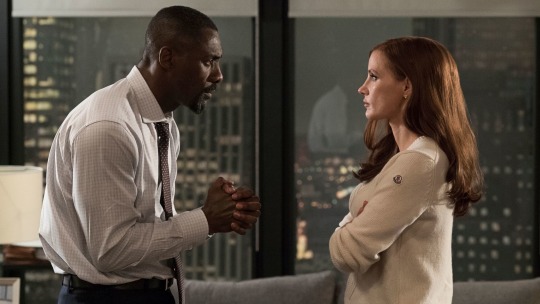
“I was raised to be a champion. My goal was to win. At what and against whom, those were just details.”
Let’s not beat around the bush on this one. My love for this film comes almost exclusively from my love for Aaron Sorkin’s dialogue. Sorkin’s quick-witted way of writing is certainly not realistic by any stretch of the imagination, but allows for great lines and a thrilling way of telling a true to life story that might otherwise come off as a bit bland. Molly’s Game follows Molly Bloom (expertly portrayed by Jessica Chastain) who became a target of the FBI after running an underground poker game for years. It’s a truly larger than life story, which, knowing Sorkin’s penchant for twisting facts for a better story, probably is. But in the moment that doesn’t matter. I was fully engrossed by the fast paced dialogue, the top-notch performances, and the thrilling pacing of this outstanding story.
9. The Disaster Artist
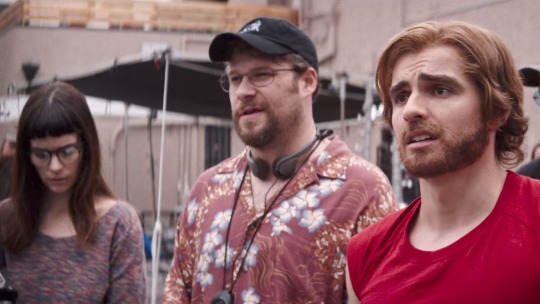
“Greg, you have to be the best. You have to be the best you can be. And never give up.”
When I first heard that a film was being made all about the making of one of the best so-bad-it’s-good films ever made, I was on board. Although I would have never predicted the end product would be something so inspirational. The Disaster Artist follows Greg Sestero who, after meeting the infamous Tommy Wiseau, moves to Los Angeles to star in The Room. While the comedy and performances surrounding this retelling of a cinema-changing event are certainly very well done, it’s the inspiration I found in Wiseau that made me love this film. It’s easy to laugh along at The Room for its utter incompetence as an example of the entire medium, but when I took a step back to look at the passion and love for this story that Wiseau so obviously had, and his uncompromising dedication to making sure his directorial vision shone through, I began to see the man behind the film in a much different light, and one that inspired me to ‘be the best I can be. And never give up.’ ‘What a story, Mark!’...okay, I’m done now.
8. The Big Sick
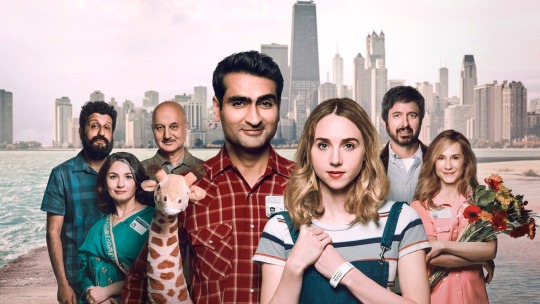
“I’m guessing it’s a young, single Pakistani woman who just happened to be driving by our house, which is on a cul-de-sac.”
I shouldn’t have waited to watch The Big Sick as long as I did. It became instantly clear as soon as the credits began to roll that this would become the new standard that all romantic comedies are held to. Kumail Nanjiani’s performance is one of the most hilarious and heart-breaking of the year as he plays himself in a dramatization of the time Emily V. Gordon, Nanjiani’s girlfriend at the time, went into a medically induced coma with a mysterious disease. The writing is what really stands out here, with the entirety of it being written by Gordon and Nanjiani themselves. The laugh-out-loud moments mixed with the emotionally moving plot, affected me in a way few films have, making this one of the greatest rom-coms to ever exist. Oh, also, Holly Hunter is hilarious in this.
7. Get Out
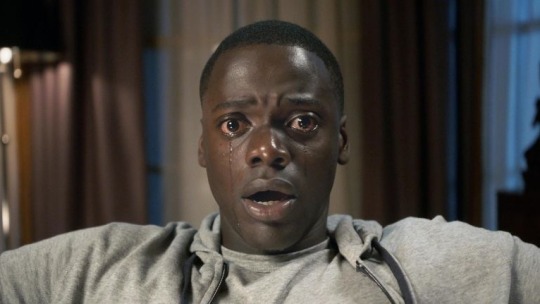
“Now you’re in the sunken place.”
Get Out’s position has fluctuated the most out of any other film this year. Unsurprisingly though, it has always stayed quite high. Jordan Peele’s debut film is one that even veteran directors would be proud to have made, considering there are so few movies that even come close to how clever this film is in both its horror and social commentary. Every frame is so jam-packed with details that, though they may feel arbitrary at the time, provide us with a deeper look at characters, their motivations, and even their deeper psychology. Every moment is important with no time being wasted. Every performance (especially Daniel Kaluuya’s) is layered and nuanced with excellent characterizations. Get Out is a horror masterpiece that I am certain will be looked back on with the highest regards in years to come.
6. Star Wars: The Last Jedi
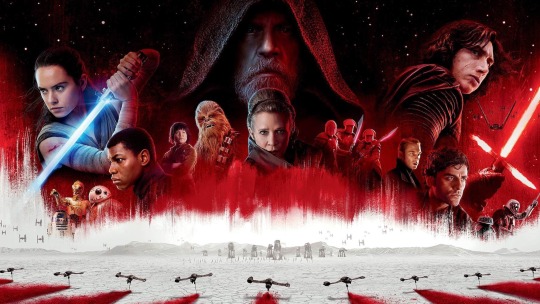
“Let the past die. Kill it, if you have to.”
I would have never guessed that putting a Star Wars film this high on an end of the year list would warrant so much controversy, but here we are. While I can understand a few of the complaints surrounding a few moments in Star Wars: The Last Jedi, I honestly cannot wrap my head around calling this an objectively bad film. It is quite possibly the most expertly shot and cleverly written film in the entire franchise, and the directions Rian Johnson decided to steer the franchise are some of the most exciting yet. It takes everything we thought we wanted out of a follow up to The Force Awakens and turns it on its head. It delivers wonderful characters to us, both new like Rose Tico, and old like Luke Skywalker. Most importantly, it gives me a story that makes me proud to be such a fan of a galaxy far, far away. Also, I’m now a huge fan of the space battles. I’m not really sure when or how that happened.
5. The Killing of a Sacred Deer

“A surgeon never kills a patient. An anesthesiologist can kill a patient, but a surgeon never can.”
Once again this year, we have another Colin Farrell led Yorgos Lanthimos film as my number five film of the year. While The Killing of a Sacred Deer is a different genre than last year’s The Lobster, his truly unique style of direction and dialogue remains. Lanthimos is a master at creating the cinematic feeling of an idyllic utopia, whilst making nearly every moving part feel off at the same time. His style is very ‘uncanny valley’ in that way, and while that may turn people off from his films, I can’t help but be glued to the screen. I was riveted by his off-kilter method of storytelling and his purposefully wooden dialogue. Farrell gives another great performance here, with Nicole Kidman stealing the show as she injects a small amount of actual emotion and fear into the picture. For those looking for something unconventional and disconcerting out of their cinema, I can’t recommend The Killing of a Sacred Deer enough.
4. Dunkirk
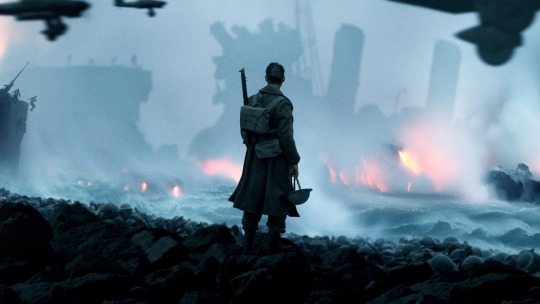
“If we go there we’ll die.”
Dunkirk is, without a doubt, Christopher Nolan’s most masterfully crafted film. Inception may still stand as my favorite, but when it comes to the sheer skill and effort on display, it’s nearly impossible to see this as anything less than a technical masterpiece. Nolan’s knack for creating emotional moments, intense heart-pounding action sequences, and non-linear stories perfectly works its way into the setting of World War 2, while also introducing me to an inspiring story I had never heard before. And yes, I still like to call this Anxiety: The Movie. If you’d like to read more of my thoughts on Nolan’s magnum opus, you can do so here.
3. Baby Driver
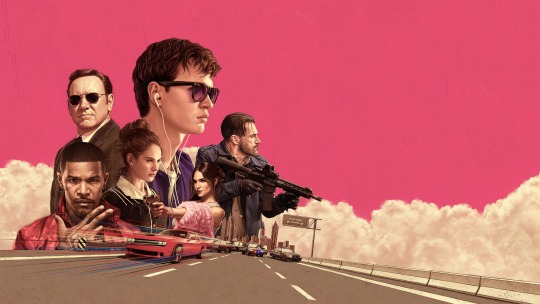
“The moment you catch feelings is the moment you catch a bullet.”
Though I don’t normally set up my rankings with subcategories in mind, if I did, Baby Driver would win Best Soundtrack without a single hesitation. Edgar Wright’s creative vision for this music-based heist film is absolutely stellar. Each scene is interwoven with music of all different sorts of genres and time-periods, with each of the heists and action sequences in the film playing out in-time with each song. It’s honestly a marvel that it was done this expertly. From the very opening scene I was smiling ear-to-ear and tapping my foot along with every backbeat and wheel-screech I could hear. Baby Driver, though fairly played-out in its story, survives and even thrives on the style that is oozing out of every frame. Edgar Wright is a directorial genius, and I can’t wait to see what he has up his sleeve next. Oh, and it you didn’t want to drive around listening to John Spencer Blues Explosion’s “Bellbottoms” directly after listening to this...you’re lying.
2. A Ghost Story
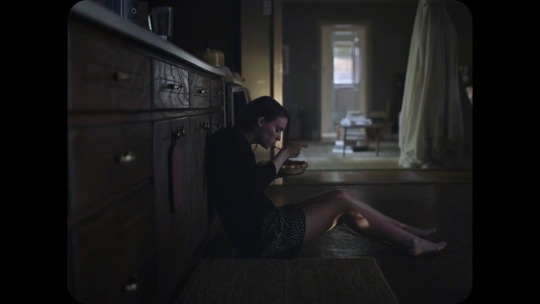
“I don’t think they’re coming.”
Rooney Mara eats an entire pie for four and half minutes in this film, and I’d be lying if I said that I wasn’t bawling with every bite she took. That’s just A Ghost Story for you though. By the time the credits began to roll my face hurt because of how long I had been ugly crying. Though I’m certain not everyone will have this strong of a reaction to the film, David Lowery’s deeply introspective film about loss and the inability to stop time from slipping through our fingers struck a massive chord with me. Every small motion, every flashback to happier times, and every major life event that flashes by left me emotionally devastated. It tapped into my own personal fears about love and legacy and whether or not we’ll be remembered when we pass, all the while providing one of the most compelling stories about the supernatural using barely any dialogue at all. A Ghost Story is a fantastically made and deliberately paced film that will haunt me for years to come...sorry, that pun was just too easy.
1. Lady Bird
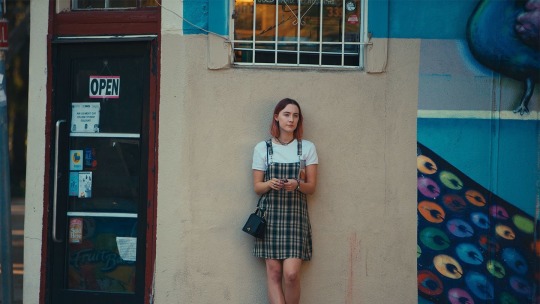
“Don't you think maybe they are the same thing? Love and attention?”
Here we are, my number one favorite film of 2017. It’s been a long time coming, and we’ve discussed many other great films from the year, but in the end it could have only been Lady Bird, couldn’t it? There’s a certain undeniable love and connection I feel to coming of age films, and Greta Gerwig’s semi-autobiographical masterpiece is no exception to that. Lady Bird follows a young woman (Saoirse Ronan) in her last year of high-school as she struggles to make a place for herself in the world. Ronan is an absolute delight as Lady Bird and has a chance to show her range as one of the greatest up-and-coming actresses through outstanding comedy and emotionally heartfelt moments. It’s honestly hard for me to describe what it is I love about this film so much though. Like most coming of age films, everything I took from Lady Bird feels so personal to me. Gerwig’s writing is so uncannily realistic and resonant in my life because she is able to capture the wild absurdity of growing up while also handling complex issues and relationships in such interesting ways and through her weaving of nostalgia and comedy, she creates one of the greatest films about growing up that I have ever seen. I don’t want to spoil any larger character moments or fantastically written emotional climaxes, so I will leave you all with something I can say with the utmost confidence. Lady Bird is one of the few film experiences that everyone should have.
#Molly's Game#The Disaster Artist#The Big Sick#Get Out#Star Wars: The Last Jedi#The Killing of a Sacred Deer#Dunkirk#Baby Driver#A Ghost Story#Lady Bird
2 notes
·
View notes
Text
Review: BLACK MIRROR Season 4 (Part II - Episodes 3 & 4)
New Post has been published on https://nofspodcast.com/review-black-mirror-season-4-part-ii-episodes-3-4/
Review: BLACK MIRROR Season 4 (Part II - Episodes 3 & 4)
SPOILER-FREE REVIEW
While “Crocodile” felt a bit like a filler episode, lacking the nuance and depth of the best of Black Mirror, the issue it examines (surveillance and the sanctity of thought) is interesting. Some moments shine.
“Hang the DJ” is Brooker back to True, at his best. Delicately structured, wonderfully shot, incredible concept…another bit of spec-fiction brilliance.
EPISODE 3: CROCODILE
If you read my first review, you’re probably still wiping off the drool from all my slavering praise. The season’s first two episodes are incredibly strong. “Arkangel” could very well show up in this year’s Emmy roster. “USS Callister” might be one of the single best episodes of anything I’ve ever seen.
“Crocodile” struck me a little bit differently. The episode starts with a hit-and-run accident (think I Know What You Did Last Summer, but more bleak, less Sarah Michelle Gellar). Mia (played by Andrea Riseborough) wants to go to the cops, but Rob (Andrew Gower) was driving drunk. He convinces her to dump the body and keep the secret.
There’s a thin line between “subtle” and “slow.” For me, “Crocodile” fell firmly in the mire of the latter. After the masterful structuring, nuance, and depth of the first two episodes, this episode is a bit of a slump. The stakes are part of the problem. Or, rather, the lack thereof. From the beginning, I didn’t care much about Mia: when Rob runs over the cyclist, she lets herself be steamrolled into keeping it quiet. When he gets sober and tries to make amends for what they’ve done, she kills him to protect the shiny, new, successful life she’s built. Wife. Mother. Architect with daring hair.
Except…we hardly see any of that life. Her husband is onscreen for maybe three total minutes, and we’re given no reason to empathize with him. Same with her son: he’s just a male human child, more the outline of a character than anything.
There’s a strange sterility in many of the characters, actually. Nobody seems to really mean anything to anyone. It’s like they’re all actors on a stage together, and they vanish from the world the moment the camera looks away. They are without weight or life. What characterization there is feels a bit like Bella’s clumsiness in Twilight. Lacking any real inner life or depth, Bella is “clumsy.” Some of us are clumsy. Thus, we can relate to her.
In “Crocodile,” Shazia (Kiran Sonia Sawar) pops peppermint candies and likes pop songs. What are her dreams? Who does she admire? We find out in the end that she has a child with her husband, Anan, but I only know for sure that they’re married because the characters have the same last name on IMDB. He buys her a hamster, they talk about what time she’s going to be home. That’s sort of it. There’s no sense of history, or sexuality, or chemistry.
They both get murdered. That’s pretty much all they have in common, as far as I can tell. We almost get a peek into Anan’s inner workings (he’s watching a movie when Mia comes for him), but…nope. All we get is the credits. Even our ostensible protagonist, Mia, is flat and gray as the landscape she lives in. (The scenery in this episode is the highlight. Shot in Iceland, there’s a rocky, desolate beauty that is almost a story in and of itself. The wide tracking shots of cars slipping along barren landscapes and empty roads like black clots into the heart of the wild are breathtaking.)
When Mia was young, she liked to party and dance all night. Some of the younger viewers probably like to party and dance all night. What do women drink? (White wine.) What do women do when they murder people? (Almost lose it, but keep it together. Drink white wine.) You see what I’m getting at.
With nothing to invest me, watching Mia murder people wasn’t so much shocking and horrifying as perplexing. And a little frustrating: I was interested to learn more about this newly-sober Rob. Maybe see something of their relationship. Oh. Mia killed him. This investigator might be on to what Mia has done. Oops. Dead. The investigator’s husband knew where she was going, so…nope. Also dead.
Even the baby at the end felt more like a cheap attempt to get me to feel something, like Killing the Dog. I assume Brooker was going for dark irony when the Detective reveals that the baby was blind all along. (So Mia killed him for no reason! Gasp!) But it ends up feeling so shoehorned-in and clunky that it falls flat.
There are definite high points and powerful moments in the episode. By high points, I mean one of the darkest, most disturbing things I’ve ever seen on a screen. This in a series that showed us a man having sex with a pig for nearly an hour.
Watching Mia examine Shazia’s memories without permission was excruciatingly like watching a rape scene. I think Brooker’s larger point about the theme of the episode is colored in, here, and in an episode I was fairly uninvested in, this scene stands out as masterful. Sawar’s acting, the sense of despair and rage and violation, is superlative. Riseborough stays on note, but the flatness of her deliveries works well in contrast to the work Sawar is doing. I nearly cried when Shazia started praying through the gag in her mouth.
Though similar ground was covered in earlier episode of Black Mirror (namely, Season 1, Episode 3: “The Entire History of You”) the thesis of the episode is interesting: what happens when the final privacy is removed? What happens when not even the contents of your mind are safe anymore?
Perhaps it’s reflective of the current political climate that two episodes in a row are addressing Orwellian concepts. Surveillance is a word that raises hackles. “Crocodile” raises questions. As Shazia points out to Mia when she comes to watch her memories, Mia is now required by law to talk about an incident if she’s seen it. The cameras Shazia might have used were vandalized, but what does she care? When you have legal leverage to look at people’s memories, everyone is a camera for the government. We are the surveillance. Big Brother is Us.
EPISODE 4: HANG THE DJ
The Mobius Story is a tried-and-true staple of the Sci-Fi/Fantasy genre. It’s also quite the tricky mistress. But this is Charlie Brooker (sole writing credit) we’re talking about here. With Timothy “Boardwalk Empire” Van Patten in the director’s chair.
Let’s just say they pull it off.
If you haven’t seen it, and you’re still reading this: don’t. Don’t ruin this one for yourself. “Hang the DJ” is too clever, the payoff and final implications too mind-blowing to wreck reading a summation and analysis. So. Go on. Watch it.
“Hang the DJ” is, on the surface, a story about the inevitable future of dating apps and online dating. Frank and Amy are two participants in a new dating program. The computer dictates not only who you are in a relationship with, but predetermines how long that relationship will last. It is infallible. The data it collects from the relationships (experiments?) it puts you through supposedly allows it to predict with 99.8% accuracy who your perfect lifemate will be. It’s never wrong. Nobody ever questions the authority of the program.
The episode asks the simplest, most powerful question science fiction can ask:
But what if…?
There’s innumerable little bits we could dig into, but the two titanic elements that stand out and most need applause (roaring, standing, bleeding-palms applause) are: the Structure and the Irony. The way the end of the episode feeds back into the beginning feeds back into the end and on into infinity is very much in the spirit of the Mobius Strip. Up until the end, “Hang the DJ” is a good episode. The last five minutes are what make it a great episode.
It would be easy to write the O. Henry twist off as “Oh, really? ‘It was all a dream?’ Great.” But it’s so much more than that. So much more. The recursive genius of that twist was stunning: a dating app measuring compatibility by how many times a couple rebels against that dating app. I’ve said before that Brooker understands capital-I Irony in a way that very few people do.
Well, here: exhibit A. Think about the nuance and implications of that: the episode postulates a computer program that manages to simulate the irrationality and fire of the human heart, and then factors it in to its program in order to mitigate that factor in the real world. Is the final meeting between Frank and Amy hopeful? A happy ending mirroring the arc of their Romeo/Juliet computer analogs? Or is it showing us the real-world beginning of the very program that the app postulates in its calculations?
Not one to twist a knife just once, Brooker’s twist cuts a layer deeper, upon reflection. The app is so elegant and effective that, almost inevitably, its success in the real world will ultimately lead to the world it bases its simulations in. Excusez mon francais, mais… That is fucking brilliant.
Black Mirror explored similar territory in Season 1, but there’s so much more elegance here, such grace. Do we really want to know? All of it? Really? I don’t want to, and, neither, I think, does Charlie Brooker. There’s comfort in the fog. Perhaps the spark of life is really the little thrill of fear we feel in the face of the unknown.
IN SUMMATION
“Crocodile” might be your cup of tea. Maybe you need some shock-for-shock’s-sake TV. Maybe you like peppermint candy and pop music. It wasn’t really for me.
“Hang the DJ” has the sort of Forged of a Piece flawlessness that fans of the show came for and stayed for through the first two seasons. One of the great ones.
There’s less cohesion between these two than there was between “USS Callister” and “Arkangel,” but an overarcing 1984-esqu thread is emerging. Control. Privacy. Freedom. These are the concerns this time around.
Timely concerns for all of us, indeed.
#black mirror#Brooker#Charlie#Crocodile#Hang the DJ#horror#horror 2018#horror review#horror tv#netflix#new horror#review#sci-fi#Season 4
1 note
·
View note
Text
People Are Ruining Books By Adding Or Changing Just One Word That Totally Changes The Meaning (125 Tweets)
Jimmy Fallon, the host of The Tonight Show, had a brand new challenge for his followers. Moving on from ruining a movie title with just a word, he asked his fans to think about how they’d ruin a book title with a single word for the #AddAWordRuinABook challenge.
And, boy, did they deliver! It’s hilarious to realize how much adding just a single word can change our perception of a book. As it turns out, humor is just a few letters away, whether we’re talking about The Lord of the Onion Rings or The Curious Incident of the Hotdog in the Nighttime.
We’ve collected some of the best responses that people had to Jimmy’s challenge, so scroll down and prepare to giggle quite a bit. And be sure to let us know in the comments your own ideas of how you’d ruin a book title.
When you’re done with this list, have a look through Bored Panda’s other articles about Fallon’s previous challenges, from the dumbest family fights to the coldest insults that people have gotten.
Image credits: jimmyfallon
#1
Image credits: RyanBartholomee
#2
Image credits: Eff_This_Crap
#3
Image credits: mrbudolmstead
Jokes aside, reading books is a great way to increase your brain power, improve your analytical skills, and can even increase your empathy because you’re privy to the characters’ emotions. Furthermore, people who read have a lower risk of developing Alzheimer’s Disease because they’re keeping their brains active.
#4
Image credits: RyanBartholomee
#5
Image credits: imluckym
#6
Image credits: SellecksM
What’s more, reading’s a far better alternative than sitting in front of a glowing screen before bedtime. In other words, grab a book instead of your phone to sleep better. And if you want your kids to read more in the future, reading out loud to them has a very positive effect. Of course, this requires some additional effort from the parents themselves, but who doesn’t love story time?
#7
Image credits: magicdel
#8
Image credits: RyanBartholomee
#9
Image credits: DanInsinga
However, there’s a difference between reading Harry Potter for the billionth time and picking up something from the classics for the very first time. Now, don’t get me wrong, there’s nothing wrong with the adventures of The Boy Who Lived, but the classics greatly improve your vocab, social perception, and even emotional intelligence. What’s more, they’ll help you understand yourself in a deeper, more nuanced way. So grab one of the books that people ruined by adding a single word to the title, and read away!
#10
Image credits: TylerLampe
#11
Image credits: whitaker_becca
#12
Image credits: lotterleo
#13
Image credits: crystalwithluv
#14
Image credits: LukeAshton
#15
Image credits: Jenni_Marie8819
#16
Image credits: vickilovestacos
#17
Image credits: howieyanow
#18
Image credits: LermaShelley
#19
Image credits: baechamelanie
#20
Image credits: JoeZieja
#21
Image credits: trekkie71
#22
Image credits: twoMutch
#23
Image credits: dougie_legend
#24
Image credits: RHarringtonNY
#25
Image credits: dunathema
#26
Image credits: thekholly11
#27
Image credits: MathewTsang
#28
Image credits: hsunaik
#29
Image credits: 09CivicSiBrian
#30
Image credits: PalominoDeb
#31
Image credits: RealRandyPryor
#32
Image credits: Emiliyadanielle
#33
Image credits: JoNzYyyyy
#34
Image credits: HolyDrogon
#35
Image credits: SimplyIxia
#36
Image credits: gregolear
#37
Image credits: JoeZieja
#38
Image credits: MrRaceBannon
#39
Image credits: GrantDeArmitt
#40
Image credits: JoeZieja
#41
Image credits: AnimationOnFOX
#42
Image credits: LizWFab
#43
Image credits: JayCaruso
#44
Image credits: RadiantRaylaB
#45
Image credits: candlesdanielle
#46
Image credits: sjpmcintyre
#47
Image credits: Gwen_Bayliss
#48
Image credits: Cyndidegarlais
#49
Image credits: NicoleWilson583
#50
Image credits: k0ol1
#51
Image credits: KerinOn
#52
Image credits: BenSoloIsUs
#53
Image credits: manofdays39
#54
Image credits: TheTylt
#55
Image credits: Skittles
#56
Image credits: EmilyGorcenski
#57
Image credits: nuffintosay
#58
Image credits: turbomoler
#59
Image credits: Darkarnival1
#60
Image credits: RHarringtonNY
#61
Image credits: freefunnelclub
#62
Image credits: eteter
#63
Image credits: MegsHAUSTED
#64
Image credits: QuantumFlux1701
#65
Image credits: LawTurley
#66
Image credits: krklemm
#67
Image credits: stutay73
#68
Image credits: allielolrence
#69
Image credits: Jennife29809945
#70
Image credits: realMrChristie
#71
Image credits: jimchines
#72
Image credits: momjeannes
#73
Image credits: SilERabbit
#74
Image credits: keet0007
#75
Image credits: jrwebber16
#76
Image credits: DawnieOfficial
#77
Image credits: StephenHeston
#78
Image credits: jeremyart
#79
Image credits: itsgonnabeyou96
#80
Image credits: V1971Shannon
#81
Image credits: LisaMurray_89
#82
Image credits: brianlokker
#83
Image credits: jparadise69
#84
Image credits: MathewTsang
#85
Image credits: AlfredTuvey
#86
Image credits: webhank
#87
Image credits: itsMeLlama
#88
Image credits: nicolegirlie7
#89
Image credits: Kiki_Gray
#90
Image credits: gopokes420
#91
Image credits: katiejpaschke
#92
Image credits: londen_tabor
#93
Image credits: RyanBartholomee
#94
Image credits: TysonFish88
#95
Image credits: mills__elise
#96
Image credits: alis_Nwondrland
#97
Image credits: RealRandyPryor
#98
Image credits: silver_swords
#99
Image credits: robserdaly
#100
Image credits: pookiesmith2424
#101
Image credits: ashwadsoup
#102
Image credits: EmilyGorcenski
#103
Image credits: PositivePyrami1
#104
Image credits: MonsieurFriend
#105
Image credits: milkybarnick
#106
Image credits: TonicallyGin
#107
Image credits: Kiki_Gray
#108
Image credits: AaronNetsky
#109
Image credits: TipsyElves
#110
Image credits: Haley_Victory
#111
Image credits: Carl_Stawicki
#112
Image credits: gumgumerson
#113
Image credits: jmurrey68
#114
Image credits: MeganStotts1
#115
Image credits: BeingNateBrown
#116
Image credits: kellcowley
#117
Image credits: ericvale
#118
Image credits: guruneilchristy
#119
Image credits: katiesasters
#120
Image credits: HapkidoBigDad
#121
Image credits: LauraTisdall
#122
Image credits: NicoleWilson583
#123
Image credits: EricWolfson
#124
Image credits: DoujinDev
#125
Image credits: SimplyIxia
from Funny – Bored Panda https://ift.tt/2O8aygf via IFTTT from Blogger https://ift.tt/37FXMxw
0 notes
Note
I wish you would write a fic where Bill and Laura attend the same book club at a local community center and end up making wisecracks about the leader's book selections.
A quasi-continuation ofthis fic, also prompted by my darling @cassiopeiasara in which the attacksnever happened, but it totally went off the rails. Please suspend disbelief on the book choice – it’s the worstone I could think of. Besides, even in the BSG universe, I’m sure bad teenage vampirefanfic that became a bestseller isn’t too far out of the realm of possibility.Also, this is rated M-ish for discussion matter, not for content.
If there’s one thingLaura Roslin understands, it’s government funding. Having spent the better partof the last fifteen years of her life fighting for scraps in the Capricabudget, she’s not going to pass up a program that funnels valuable cubits intothe public library system.
Even if the publicengagement grant means she spends her Tuesday nights sitting in the library’scommunity room, dutifully following along to whatever crap novel the DelphiBook Club has picked.
She doesn’t mind theidea of a book club; she has a doctorate in literature, and there are fewthings she loves more in the worlds than discussing books. She still underlinesand dog-ears pages of each book she buys, and she revisits old books like oldfriends, taking them to a café or a stroll on the Riverwalk and asking them howthey’ve been, what she’s missed since the last time they saw each other. Everytime, she finds another nuance to a phrase or hidden meaning in a chapter.
No, talking about booksisn’t the problem. Talking about books with people who never go deeper thandescribing who should play the leading characters in the movie is the problem.
And this book. Gods, this book. If she had something better to do withher time, she’d quit the library right now and never look back. Laura has adoctorate in literature, but she’s not a fiction snob. She’s read bodicerippers and pink books and dime-store mysteries, but this book is just…it’s theworst book she’s ever read.
It’s been a while sinceshe had sex – since before her diagnosis – but even she’s sure that thepoorly-portrayed S&M is the figment of some repressed spinster’simagination. The only good thing about reading this book is imagining howCheryl and Sandra would have laughed, sneaking into her room after theirparents went to bed, flashlights in hand, and reading the juicy bits as theyhuddled under her comforter.
For a book that’s almostentirely about sex, she can’t quite wrap her head around the fact that thestrongest expletive the leading lady says is “Oh, gosh!” Further proof that theauthor never had the kind of athletic, sweaty, most likely regrettable sex thatled Laura into her political career to begin with.
Not that she’s going tovolunteer that information tonight. She’s just going to smile and nod and maybemake some comments after the book club meeting ends about the proper use ofmetaphors while she hands out weak lemonade and grocery store cookies. In themeantime, she’s going to hide in her chair in the corner of the room and hopenobody sits next to her.
She catches a shadow outof the corner of her eye. No such luck. Please, lords of Kobol, don’t let it besomeone who wants to whisper about the handsome hero or regale with tales oftheir own steamy past loves. Or worse, complain that the leading man is nowherenear as loving and loyal as her ten cats.
“I take it you didn’tpick the book,” the person beside her says, and Laura’s head jerks up. Sherecognizes his voice and kicks herself for not recognizing the rest of himbefore he took up residence in the chair next to her.
Bill Adama. She hasn’texchanged more than a few words with him since the night she dropped a book on hishead. He’s been at the library regularly in the months since, and they exchangewaves or quick pleasantries, but she’s been careful to avoid anything more thana polite greeting. Sometimes he’ll drop a book on the circulation desk whileshe’s on the computer, and she’ll hum in response to his thoughts, but that’sit.
She’s being rude, sheknows, but she’s not quite ready for Bill Adama in her life, asking her whatshe thinks about this book or that author. She’s not ready to have her thoughtsbelong to someone else again, especially not him. She tugs at a lock of hairthat’s just now started to brush her shoulders.
“I didn’t pick the book,”she says. “But I did pick the cookies.”
“Something to lookforward to,” he replies. He doesn’t wait for her to respond; he turns and looksexpectantly at the book club leader. She steals glances at him as they gothrough the book, watching his thumb as it follows along with passages readaloud. The teacher in her would be proud of him; he’s alert and focused, and ifit weren’t for the periodic sighs or light snorts when they get to aparticularly explicit paragraph, she’d give him full marks for participation inthe night’s discussion.
She’s so invested inwatching him watch the group that she hasn’t heard a word for the last tenminutes or so, until her subconscious – or the little voices of her sistersstill ringing in her ears – catches one of the women in the circle asking quiteclearly, “What are anal beads, exactly?”
She can’t help it. Shetries to bite her lip, tries to duck her head into the collar of her jacket,tries to curl up and disappear on the spot, but the giggles escape before shecan get a handle on herself.
If her dissertation committeecould see her now, listening to a middle-aged woman explaining anal beads, they’drescind her doctorate. And she can’t blame them.
She also can’t stoplaughing, once she starts. She tries to cover it with a cough, tries to breathethrough the giggles, but once she starts, there’s no stopping it. The best shecan do is climb over Bill Adama and run for the exit, but as soon as she looksup to plot her escape, she realizes that he’s in the same boat. The stoicmilitary commander has gone frighteningly purple, no doubt from holding hisbreath in desperate attempt to keep the laughter in.
She’s not sure whatpossesses her to do it, but she leans closer to him and whispers “anal beads”in his ear. He lets out the breath he’s holding in a sharp exhale, but she hasto give him credit for composure – his chest is heaving, but he’s dead silent. He’slaughing so hard that he can’t get enough oxygen to make a sound, and watchinghis eyes tear up with laughter is enough to send her back over the edge, herown shoulders shaking in silent mirth.
She’s still strugglingto catch her own breath when he grabs her hand and pulls her out of the room.
By the time the groupdisbands for the night, Laura and Bill have made their way through two glassesof lemonade, a plate of cookies, and piled up a stack of books between them onthe table. Between them, they’ve chosen a few classics, some noir detectivenovels, and Laura has managed to sneak in the sequel to tonight’s disastrous book.She has to admit, she’s more than a little curious to hear what he has to sayabout the subject matter when it’s just the two of them, a quiet room, maybe abottle of wine, and all the time in the world.
21 notes
·
View notes
Text
Voices in AI – Episode 80: A Conversation with Charlie Burgoyne
Today's leading minds talk AI with host Byron Reese
.voice-in-ai-byline-embed { font-size: 1.4rem; background: url(https://voicesinai.com/wp-content/uploads/2017/06/cropped-voices-background.jpg) black; background-position: center; background-size: cover; color: white; padding: 1rem 1.5rem; font-weight: 200; text-transform: uppercase; margin-bottom: 1.5rem; } .voice-in-ai-byline-embed span { color: #FF6B00; }
About this Episode
Episode 80 of Voices in AI features host Byron Reese and Charlie Burgoyne discussing the difficulty of defining AI and how computer intelligence and human intelligence intersect and differ.
Listen to this one-hour episode or read the full transcript at www.VoicesinAI.com
Transcript Excerpt
Byron Reese: This is Voices in AI brought you by GigaOm and I’m Byron Reese. Today my guest is Charlie Burgoyne. He is the founder and CEO of Valkyrie Intelligence, a consulting firm with domain expertise in applied science and strategy. He’s also a general partner for Valkyrie Signals, an AI-driven hedge fund based in Austin, as well as the managing partner for Valkyrie labs, an AI credit company. Charlie holds a master’s degree in theoretical physics from Georgetown University and a bachelor’s in nuclear physics from George Washington University.
I had the occasion to meet Charlie when we shared a stage when we were talking about AI and about 30 seconds into my conversation with him I said we gotta get this guy on the show. And so I think ‘strap in’ it should be a fun episode. Welcome to the show Charlie.
Charlie Burgoyne: Thanks so much Byron for having me, excited to talk to you today.
Let’s start with [this]: maybe re-enact a little bit of our conversation when we first met. Tell me how you think of artificial intelligence, like what is it? What is artificial about it and what is intelligent about it?
Sure, so the further I get down in this field, I start thinking about AI with two different definitions. It’s a servant with two masters. It has its private sector, applied narrowband applications where AI is really all about understanding patterns that we perform and that we capitalize on every day and automating those — things like approving time cards and making selections within a retail environment. And that’s really where the real value of AI is right now in the market and [there’s] a lot of people in that space who are developing really cool algorithms that capitalize on the potential patterns that exist and largely lay dormant in data. In that definition, intelligence is really about the cycles that we use within a cognitive capability to instrument our life and it’s artificial in that we don’t need an organic brain to do it.
Now the AI that I’m obsessed with from a research standpoint (a lot of academics are and I know you are as well Byron) — that AI definition is actually much more around the nature of intelligence itself, because in order to artificially create something, we must first understand it in its primitive state and its in its unadulterated state. And I think that’s where the bulk of the really fascinating research in this domain is going, is just understanding what intelligence is, in and of itself.
Now I’ll come kind of straight to the interesting part of this conversation, which is I’ve had not quite a hundred guests on the show. I can count on one hand the number who think it may not be possible to build a general intelligence. According to our conversation, you are convinced that we can do it. Is that true? And if so why?
Yes… The short answer is I am not convinced we can create a generalized intelligence, and that’s become more and more solidified the deeper and deeper I go into research and familiarity with the field. If you really unpack intelligent decision making, it’s actually much more complicated than a simple collection of gates, a simple collection of empirically driven singular decisions, right? A lot of the neural network scientists would have us believe that all decisions are really the right permutation of weighted neurons interacting with other layers of weighted neurons.
From what I’ve been able to tell so far with our research, either that is not getting us towards the goal of creating a truly intelligent entity or it’s doing the best within the confines of the mechanics we have at our disposal now. In other words, I’m not sure whether or not the lack of progress towards a true generalized intelligence is due to the fact that (a) the digital environment that we have tried to create said artificial intelligence in is unamenable to that objective or (b) the nuances that are inherent to intelligence… I’m not positive yet those are things through which we have an understanding of modeling, nor would we ever be able to create a way of modeling that.
I’ll give you a quick example: If we think of any science fiction movie that encapsulates the nature of what AI will eventually be, whether it’s Her, or Ex Machina or Skynet or you name it. There are a couple of big leaps that get glossed over in all science fiction literature and film, and those leaps are really around things like motivation. What motivates an AI, like what truly at its core motivates AI like the one in Ex Machina to leave her creator and to enter into the world and explore? How is that intelligence derived from innate creativity? How are they designing things? How are they thinking about drawings and how are they identifying clothing that they need to put on? All these different nuances that are intelligently derived from that behavior. We really don’t have a good understanding of that, and we’re not really making progress towards an understanding of that, because we’ve been distracted for the last 20 years with research in fields of computer science that aren’t really that closely related to understanding those core drivers.
So when you say a sentence like ‘I don’t know if we’ll ever be able to make a general intelligence,’ ever is a long time. So do you mean that literally? Tell me a scenario in which it is literally impossible — like it can’t be done, even if you came across a genie that could grant your wish. It just can’t be done. Like maybe time travel, you know — back in time, it just may not be possible. Do you mean that ‘may not’ be possible? Or do you just mean on a time horizon that is meaningful to humans?
I think it’s on the spectrum between the two. But I think it leans closer towards ‘not ever possible under any condition.’ I was at a conference recently and I made this claim which admittedly as any claim with this particular question would be based off of intuition and experience which are totally fungible assets. But I made this claim that I didn’t think it was ever possible, and something the audience asked me, well, have you considered meditating to create a synthetic AI? And the audience laughed and I stopped and I said: “You know that’s actually not the worst idea I’ve been exposed to.” That’s not the worst potential solution for understanding intelligence to try and reverse engineer my own brain with as little distractions from its normal working mechanics as possible. That may very easily be a credible aid to understanding how the brain works.
If we think about gravity, gravity is not a bad analog. Gravity is this force that everybody and their mother who’s older than, you know who’s past fifth grade understands how it works, you drop an apple you know which direction it’s going to go. Not only that but as you get experienced you can have a prediction of how fast it will fall, right? If you were to see a simulation drop an apple and it takes twelve seconds to hit the ground, you’d know that that was wrong, even if the rest of the vector was correct, the scaler is off a little bit. Right?
The reality is that we can’t create an artificial gravity environment, right? We can create forces that simulate gravity. Centrifugal force is not a bad way of replicating gravity but we don’t actually know enough about the underlying mechanics that guide gravity such that we could create an artificial gravity using the same techniques, relatively the same mechanics that are used in organic gravity. In fact it was only a year and a half ago or so closer to two years now where the Nobel Prize for Physics was awarded to the individuals who identified that it was gravitational waves that permeate gravity (actually that’s how they do gravitons), putting to rest an argument that’s been going on since Einstein truly.
So I guess my point is that we haven’t really made progress in understanding the underlying mechanics, and every step we’ve taken has proven to be extremely valuable in the industrial sector but actually opened up more and more unknowns in the actual inner workings of intelligence. If I had to bet today, not only is the time horizon on a true artificial intelligence extremely long-tailed but I actually think that it’s not impossible that it’s completely impossible altogether.
Listen to this one-hour episode or read the full transcript at www.VoicesinAI.com
Voices in AI
Visit VoicesInAI.com to access the podcast, or subscribe now:
iTunes
Play
Stitcher
RSS
.voice-in-ai-link-back-embed { font-size: 1.4rem; background: url(https://voicesinai.com/wp-content/uploads/2017/06/cropped-voices-background.jpg) black; background-position: center; background-size: cover; color: white; padding: 1rem 1.5rem; font-weight: 200; text-transform: uppercase; margin-bottom: 1.5rem; } .voice-in-ai-link-back-embed:last-of-type { margin-bottom: 0; } .voice-in-ai-link-back-embed .logo { margin-top: .25rem; display: block; background: url(https://voicesinai.com/wp-content/uploads/2017/06/voices-in-ai-logo-light-768x264.png) center left no-repeat; background-size: contain; width: 100%; padding-bottom: 30%; text-indent: -9999rem; margin-bottom: 1.5rem } @media (min-width: 960px) { .voice-in-ai-link-back-embed .logo { width: 262px; height: 90px; float: left; margin-right: 1.5rem; margin-bottom: 0; padding-bottom: 0; } } .voice-in-ai-link-back-embed a:link, .voice-in-ai-link-back-embed a:visited { color: #FF6B00; } .voice-in-ai-link-back a:hover { color: #ff4f00; } .voice-in-ai-link-back-embed ul.go-alexa-briefing-subscribe-links { margin-left: 0 !important; margin-right: 0 !important; margin-bottom: 0.25rem; } .voice-in-ai-link-back-embed ul.go-alexa-briefing-subscribe-links a:link, .voice-in-ai-link-back-embed ul.go-alexa-briefing-subscribe-links a:visited { background-color: rgba(255, 255, 255, 0.77); } .voice-in-ai-link-back-embed ul.go-alexa-briefing-subscribe-links a:hover { background-color: rgba(255, 255, 255, 0.63); } .voice-in-ai-link-back-embed ul.go-alexa-briefing-subscribe-links .stitcher .stitcher-logo { display: inline; width: auto; fill: currentColor; height: 1em; margin-bottom: -.15em; }
Byron explores issues around artificial intelligence and conscious computers in his new book The Fourth Age: Smart Robots, Conscious Computers, and the Future of Humanity.
from Gigaom https://gigaom.com/2019/02/21/voices-in-ai-episode-80-a-conversation-with-charlie-burgoyne/
0 notes
Text
Voices in AI – Episode 80: A Conversation with Charlie Burgoyne
Today's leading minds talk AI with host Byron Reese
.voice-in-ai-byline-embed { font-size: 1.4rem; background: url(https://voicesinai.com/wp-content/uploads/2017/06/cropped-voices-background.jpg) black; background-position: center; background-size: cover; color: white; padding: 1rem 1.5rem; font-weight: 200; text-transform: uppercase; margin-bottom: 1.5rem; } .voice-in-ai-byline-embed span { color: #FF6B00; }
About this Episode
Episode 80 of Voices in AI features host Byron Reese and Charlie Burgoyne discussing the difficulty of defining AI and how computer intelligence and human intelligence intersect and differ.
Listen to this one-hour episode or read the full transcript at www.VoicesinAI.com
Transcript Excerpt
Byron Reese: This is Voices in AI brought you by GigaOm and I’m Byron Reese. Today my guest is Charlie Burgoyne. He is the founder and CEO of Valkyrie Intelligence, a consulting firm with domain expertise in applied science and strategy. He’s also a general partner for Valkyrie Signals, an AI-driven hedge fund based in Austin, as well as the managing partner for Valkyrie labs, an AI credit company. Charlie holds a master’s degree in theoretical physics from Georgetown University and a bachelor’s in nuclear physics from George Washington University.
I had the occasion to meet Charlie when we shared a stage when we were talking about AI and about 30 seconds into my conversation with him I said we gotta get this guy on the show. And so I think ‘strap in’ it should be a fun episode. Welcome to the show Charlie.
Charlie Burgoyne: Thanks so much Byron for having me, excited to talk to you today.
Let’s start with [this]: maybe re-enact a little bit of our conversation when we first met. Tell me how you think of artificial intelligence, like what is it? What is artificial about it and what is intelligent about it?
Sure, so the further I get down in this field, I start thinking about AI with two different definitions. It’s a servant with two masters. It has its private sector, applied narrowband applications where AI is really all about understanding patterns that we perform and that we capitalize on every day and automating those — things like approving time cards and making selections within a retail environment. And that’s really where the real value of AI is right now in the market and [there’s] a lot of people in that space who are developing really cool algorithms that capitalize on the potential patterns that exist and largely lay dormant in data. In that definition, intelligence is really about the cycles that we use within a cognitive capability to instrument our life and it’s artificial in that we don’t need an organic brain to do it.
Now the AI that I’m obsessed with from a research standpoint (a lot of academics are and I know you are as well Byron) — that AI definition is actually much more around the nature of intelligence itself, because in order to artificially create something, we must first understand it in its primitive state and its in its unadulterated state. And I think that’s where the bulk of the really fascinating research in this domain is going, is just understanding what intelligence is, in and of itself.
Now I’ll come kind of straight to the interesting part of this conversation, which is I’ve had not quite a hundred guests on the show. I can count on one hand the number who think it may not be possible to build a general intelligence. According to our conversation, you are convinced that we can do it. Is that true? And if so why?
Yes… The short answer is I am not convinced we can create a generalized intelligence, and that’s become more and more solidified the deeper and deeper I go into research and familiarity with the field. If you really unpack intelligent decision making, it’s actually much more complicated than a simple collection of gates, a simple collection of empirically driven singular decisions, right? A lot of the neural network scientists would have us believe that all decisions are really the right permutation of weighted neurons interacting with other layers of weighted neurons.
From what I’ve been able to tell so far with our research, either that is not getting us towards the goal of creating a truly intelligent entity or it’s doing the best within the confines of the mechanics we have at our disposal now. In other words, I’m not sure whether or not the lack of progress towards a true generalized intelligence is due to the fact that (a) the digital environment that we have tried to create said artificial intelligence in is unamenable to that objective or (b) the nuances that are inherent to intelligence… I’m not positive yet those are things through which we have an understanding of modeling, nor would we ever be able to create a way of modeling that.
I’ll give you a quick example: If we think of any science fiction movie that encapsulates the nature of what AI will eventually be, whether it’s Her, or Ex Machina or Skynet or you name it. There are a couple of big leaps that get glossed over in all science fiction literature and film, and those leaps are really around things like motivation. What motivates an AI, like what truly at its core motivates AI like the one in Ex Machina to leave her creator and to enter into the world and explore? How is that intelligence derived from innate creativity? How are they designing things? How are they thinking about drawings and how are they identifying clothing that they need to put on? All these different nuances that are intelligently derived from that behavior. We really don’t have a good understanding of that, and we’re not really making progress towards an understanding of that, because we’ve been distracted for the last 20 years with research in fields of computer science that aren’t really that closely related to understanding those core drivers.
So when you say a sentence like ‘I don’t know if we’ll ever be able to make a general intelligence,’ ever is a long time. So do you mean that literally? Tell me a scenario in which it is literally impossible — like it can’t be done, even if you came across a genie that could grant your wish. It just can’t be done. Like maybe time travel, you know — back in time, it just may not be possible. Do you mean that ‘may not’ be possible? Or do you just mean on a time horizon that is meaningful to humans?
I think it’s on the spectrum between the two. But I think it leans closer towards ‘not ever possible under any condition.’ I was at a conference recently and I made this claim which admittedly as any claim with this particular question would be based off of intuition and experience which are totally fungible assets. But I made this claim that I didn’t think it was ever possible, and something the audience asked me, well, have you considered meditating to create a synthetic AI? And the audience laughed and I stopped and I said: “You know that’s actually not the worst idea I’ve been exposed to.” That’s not the worst potential solution for understanding intelligence to try and reverse engineer my own brain with as little distractions from its normal working mechanics as possible. That may very easily be a credible aid to understanding how the brain works.
If we think about gravity, gravity is not a bad analog. Gravity is this force that everybody and their mother who’s older than, you know who’s past fifth grade understands how it works, you drop an apple you know which direction it’s going to go. Not only that but as you get experienced you can have a prediction of how fast it will fall, right? If you were to see a simulation drop an apple and it takes twelve seconds to hit the ground, you’d know that that was wrong, even if the rest of the vector was correct, the scaler is off a little bit. Right?
The reality is that we can’t create an artificial gravity environment, right? We can create forces that simulate gravity. Centrifugal force is not a bad way of replicating gravity but we don’t actually know enough about the underlying mechanics that guide gravity such that we could create an artificial gravity using the same techniques, relatively the same mechanics that are used in organic gravity. In fact it was only a year and a half ago or so closer to two years now where the Nobel Prize for Physics was awarded to the individuals who identified that it was gravitational waves that permeate gravity (actually that’s how they do gravitons), putting to rest an argument that’s been going on since Einstein truly.
So I guess my point is that we haven’t really made progress in understanding the underlying mechanics, and every step we’ve taken has proven to be extremely valuable in the industrial sector but actually opened up more and more unknowns in the actual inner workings of intelligence. If I had to bet today, not only is the time horizon on a true artificial intelligence extremely long-tailed but I actually think that it’s not impossible that it’s completely impossible altogether.
Listen to this one-hour episode or read the full transcript at www.VoicesinAI.com
Voices in AI
Visit VoicesInAI.com to access the podcast, or subscribe now:
iTunes
Play
Stitcher
RSS
.voice-in-ai-link-back-embed { font-size: 1.4rem; background: url(https://voicesinai.com/wp-content/uploads/2017/06/cropped-voices-background.jpg) black; background-position: center; background-size: cover; color: white; padding: 1rem 1.5rem; font-weight: 200; text-transform: uppercase; margin-bottom: 1.5rem; } .voice-in-ai-link-back-embed:last-of-type { margin-bottom: 0; } .voice-in-ai-link-back-embed .logo { margin-top: .25rem; display: block; background: url(https://voicesinai.com/wp-content/uploads/2017/06/voices-in-ai-logo-light-768x264.png) center left no-repeat; background-size: contain; width: 100%; padding-bottom: 30%; text-indent: -9999rem; margin-bottom: 1.5rem } @media (min-width: 960px) { .voice-in-ai-link-back-embed .logo { width: 262px; height: 90px; float: left; margin-right: 1.5rem; margin-bottom: 0; padding-bottom: 0; } } .voice-in-ai-link-back-embed a:link, .voice-in-ai-link-back-embed a:visited { color: #FF6B00; } .voice-in-ai-link-back a:hover { color: #ff4f00; } .voice-in-ai-link-back-embed ul.go-alexa-briefing-subscribe-links { margin-left: 0 !important; margin-right: 0 !important; margin-bottom: 0.25rem; } .voice-in-ai-link-back-embed ul.go-alexa-briefing-subscribe-links a:link, .voice-in-ai-link-back-embed ul.go-alexa-briefing-subscribe-links a:visited { background-color: rgba(255, 255, 255, 0.77); } .voice-in-ai-link-back-embed ul.go-alexa-briefing-subscribe-links a:hover { background-color: rgba(255, 255, 255, 0.63); } .voice-in-ai-link-back-embed ul.go-alexa-briefing-subscribe-links .stitcher .stitcher-logo { display: inline; width: auto; fill: currentColor; height: 1em; margin-bottom: -.15em; }
Byron explores issues around artificial intelligence and conscious computers in his new book The Fourth Age: Smart Robots, Conscious Computers, and the Future of Humanity.
0 notes